Updates
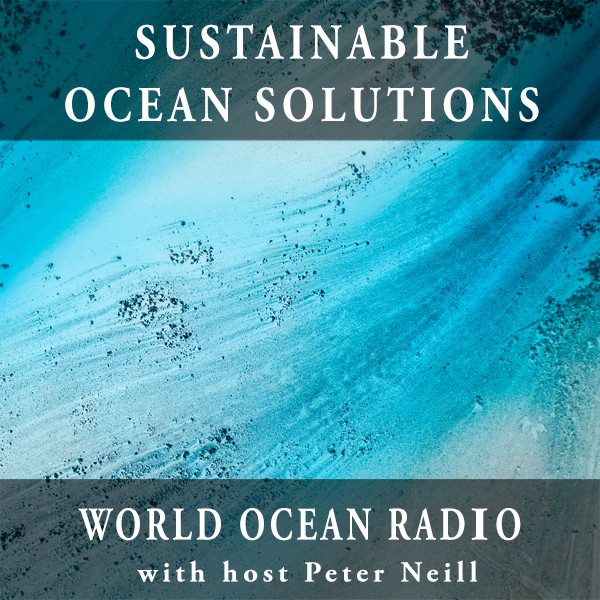 |
||
| WORLD OCEAN RADIO June 1 Sustainable Ocean Solutions This week on World Ocean Radio we are discussing the work of the Sustainable Ocean Alliance and their "222 Solutions to Heal, Restore and Sustain Our Ocean". We break down the report's accomplishments, results, facts and figures. The full report can be read at impact.soalliance.org. |
||
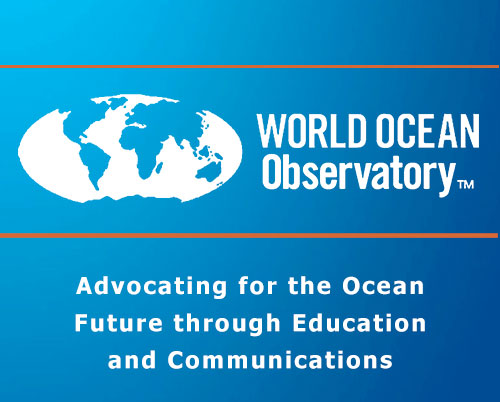 |
||
|
Making Waves: Monthly News from the W2O Not a subscriber? Sign up today. |
||
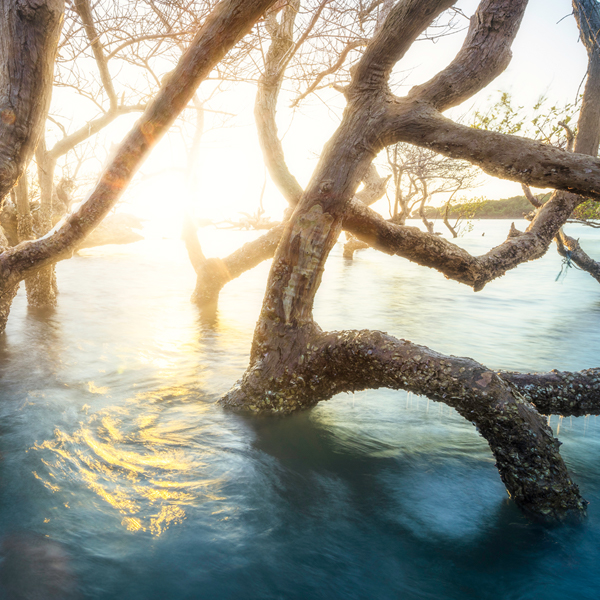 |
||
| WORLD OCEAN RADIO May 23 The Money Cycle This week on World Ocean Radio we're talking about the latest OUR OCEAN Conference in Palau and the contradiction of mangrove protection and invested monies for environmental protection interests. What happens with all the promises made at OUR OCEAN? Where does the money go? What have past commitments achieved and how are outcomes measured? |
||
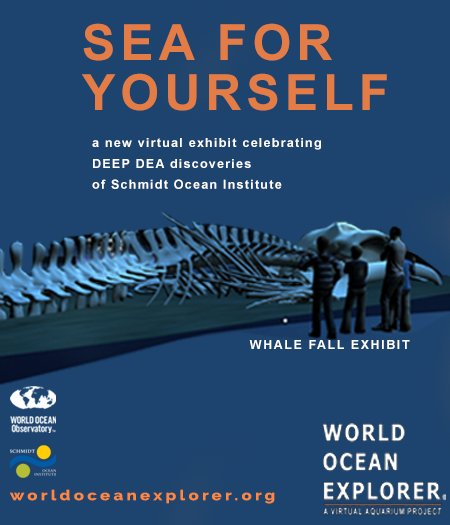 |
||
| Visit a deep-sea whale fall in 3D! One of many cool exhibits in the DEEP SEA virtual aquarium. Free for anyone with a computer and a good internet connection. Special thanks to @schmidtocean for their belief in the World Ocean Explorer project. | ||
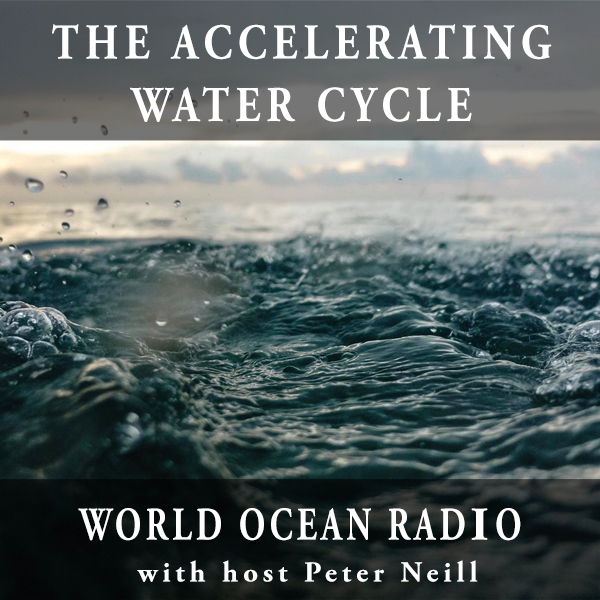 |
||
| WORLD OCEAN RADIO May 16 The Accelerating Water Cycle Climate change is accelerating change to all global systems. Do we have the power and the will to break the systemic corruption of the global water cycle and take risks to intervene and change? |
||
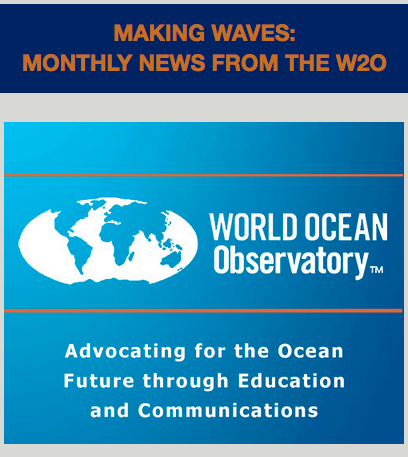 |
||
| April 28, 2022
Monthly News from the W2O |
||
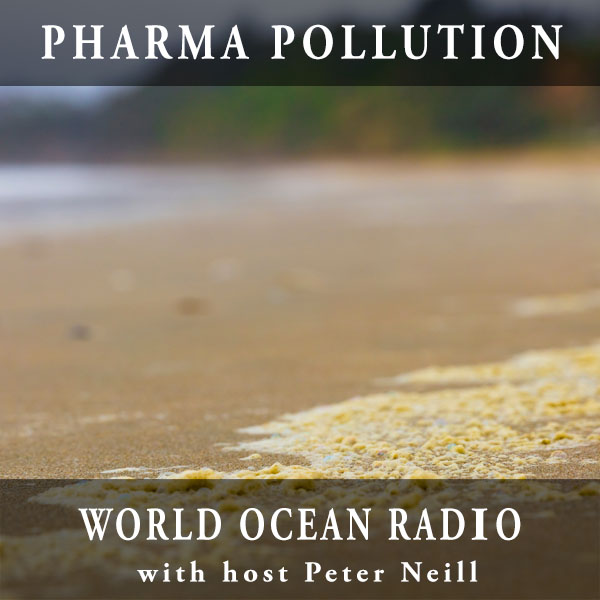 |
||
| WORLD OCEAN RADIO May 9 Pharma Pollution ThePharmaceutical pollution is as important and critical a factor for public health as microplastics and other chemical wastes that enter the water cycle, marine biota, and our bodies. A recent study by researchers at the Global Monitoring of Pharmaceuticals examined 258 rivers around the world and found that pharmaceutical pollution is contaminating water on every continent. |
||
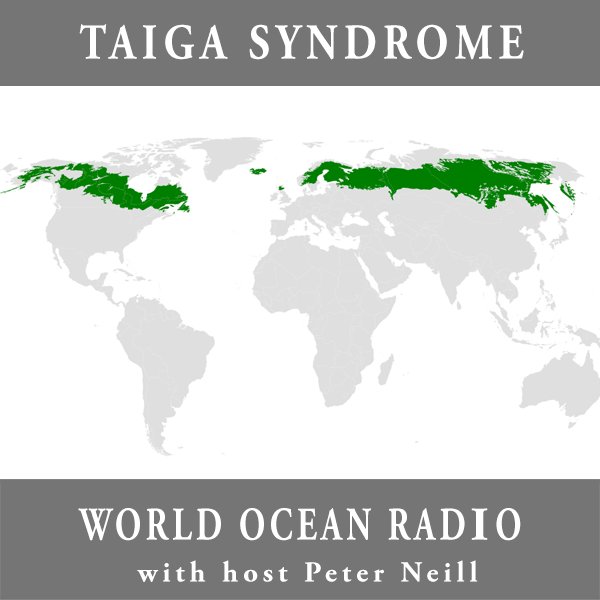 |
||
| WORLD OCEAN RADIO May 2 Taiga Syndrome Last week we discussed the vast bio-region of the Amazon River, one of the most productive and important ecosystems on the planet. This week we highlight another system--the taiga--an enormous boreal forest and wetland at the top of Canada and part of the Russian federation. Both of these systems are more valuable sustained than exploited. |
||
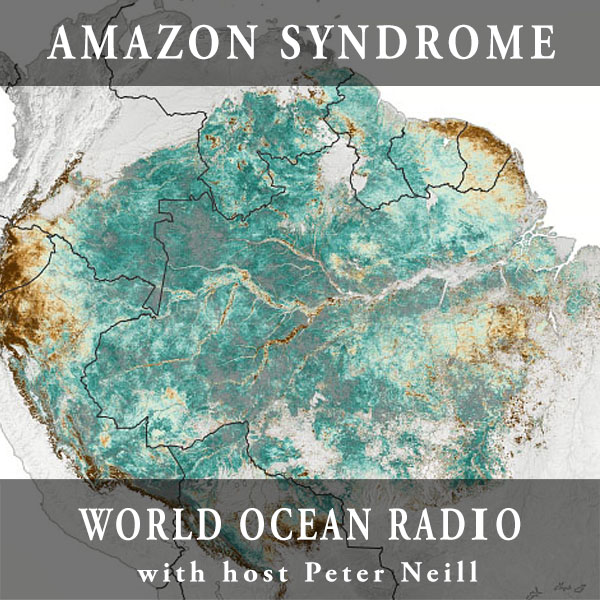 |
||
|
WORLD OCEAN RADIO |
||
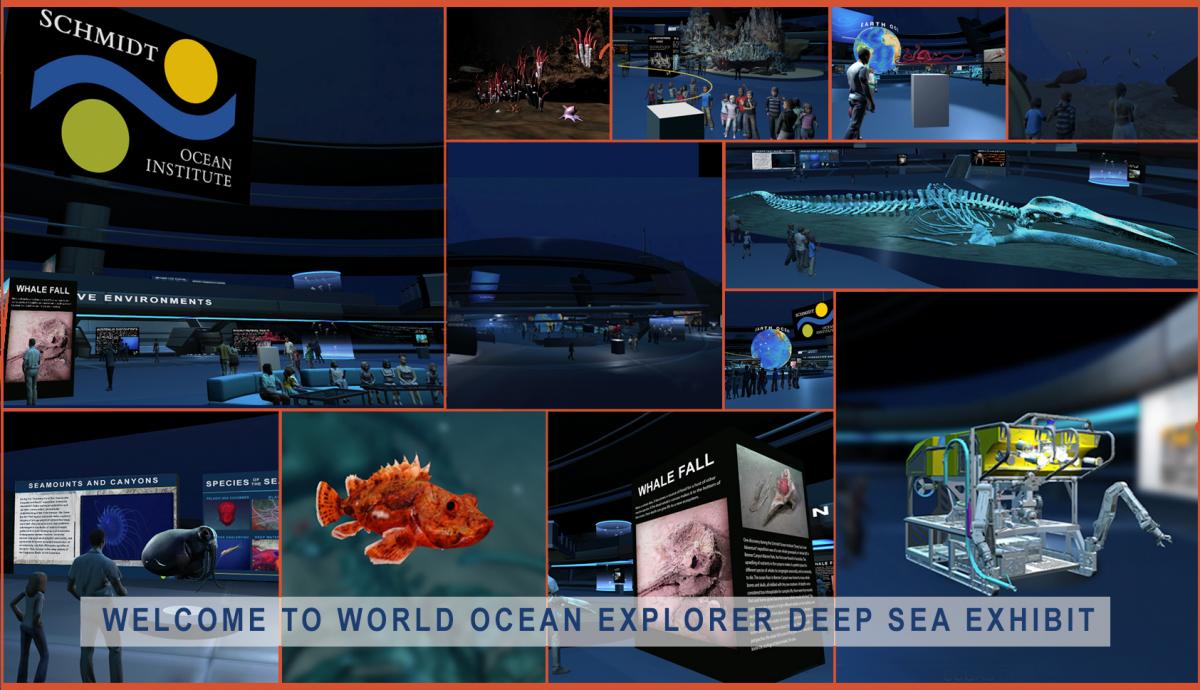 |
||
| April 19, 2022 | ||
|
DEEP SEA The virtual aquarium is absolutely free: young people and adults will enjoy exploring deep-sea ecosystems that people cannot observe in a traditional aquarium setting. Check out hydrothermal vents, whale falls, and interact with models of newly discovered species. We guarantee it’s an experience as you’ve never had. worldoceanexplorer.org ** Explorer is a WEBgl gaming program—use a Mac or PC to play. Not for mobile devices. Strong Internet connection suggested for best experience. |
||
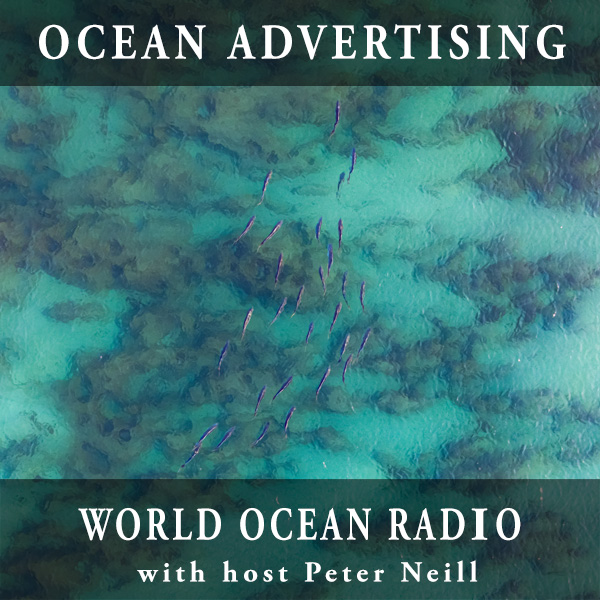 |
||
| WORLD OCEAN RADIO April 11 Ocean Advertising The biggest single problem facing ocean conversation is the lack of public awareness and political will. Public engagement efforts by agencies, institutes and NGOs are more fulsome than ever, yet the campaigns and power of those invested in the status quo to undermine the data, resist the alternatives, and misinform the public are as robust as ever. Enter The Economist Magazine--connected to more than 100 million worldwide, and their latest effort to inform the public about marine chemical pollutants. With access to such a vast audience of change agents, it is an opportunity ripe with recruitment, and an invitation for alliance and amplification. |
||
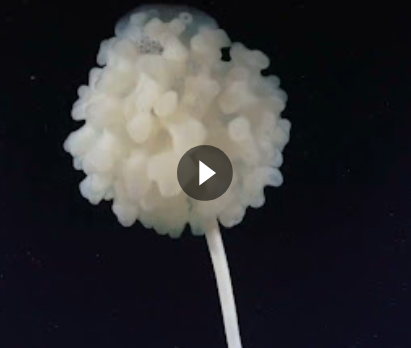 |
||
|
SEA FOR YOURSELF Try World Ocean Explorer for free today Teachers and students: this is an exciting new tool for learning about the deep sea! |
||
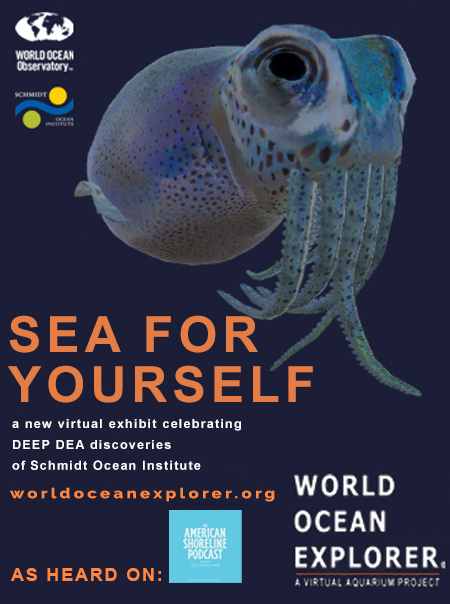 |
||
|
American Shoreline Podcast Listen via Coastal News Today and find American Shoreline Podcast wherever you listen to your favorite shows. |
||
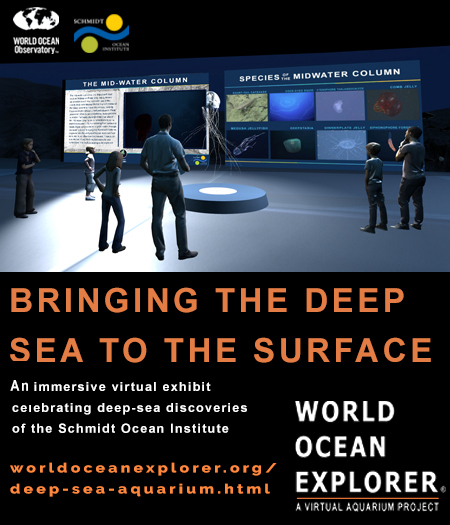 |
||
|
WORLD OCEAN EXPLORER World Ocean Observatory and Schmidt Ocean Institute are pleased to announce the release of a groundbreaking virtual aquarium exhibit. #WorldOceanExplorer lets audiences experience deep-sea animals and environments that are impossible to explore in-person. Try today at worldoceanexplorer.org/deep-sea-aquarium.html |
||
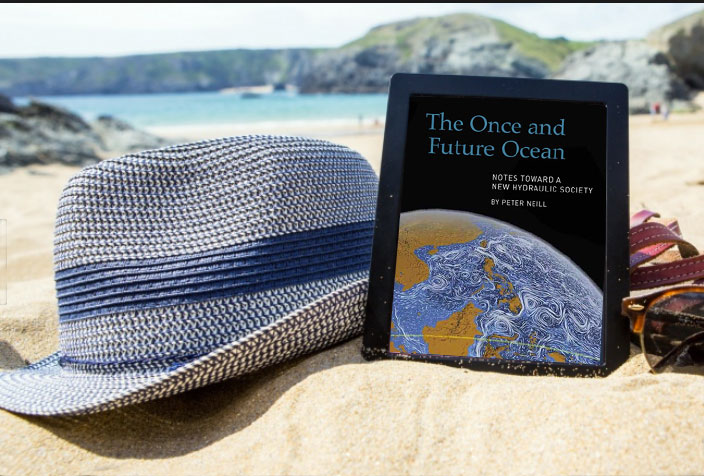 |
||
| WORLD WATER DAY
March 22 marks World Water Day, an annual United Nations Observance that celebrates water and inspires global reflection on the importance of water in sustaining a healthy planet. "The Once and Future Ocean" by Peter Neill offers notes for a new hydraulic society, and argues for invention and new solutions, for new answers to fundamental questions for our fresh water future, and for a new relationship built around the ocean as a source for new modes of living that are within our grasp if only we have the courage to take hold. |
||
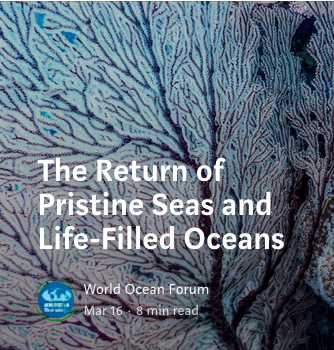 |
||
| WORLD OCEAN FORUM March 17 The Return of Pristine Seas and Life-Filled Oceans How can we turn our outdated perspective of the sea around to fit the 21st century? by Deborah Rowan Wright |
||
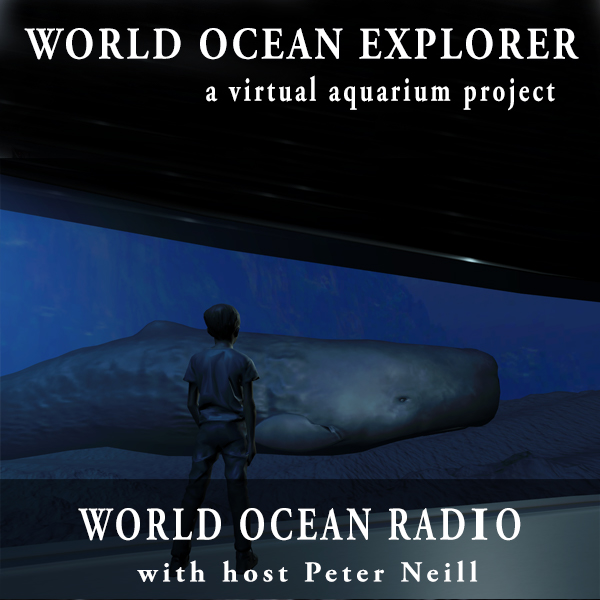 |
||
| WORLD OCEAN RADIO March 14 Introducing a Virtual Aquarium Project This week we introduce listeners to World Ocean Explorer, a new, revolutionary and immersive 3D virtual aquarium project the W2O team has been developing over the past year. Explorer is a game-based learning environment designed to promote ocean literacy and excitement for ocean exploration. Launching in late March. |
||
 |
||
| The Incredible Ruins of 12 Abandoned Islands That Have Fascinating Stories Behind Their Decline From ATLAS OBSCURA Mar 4, 2022 |
||
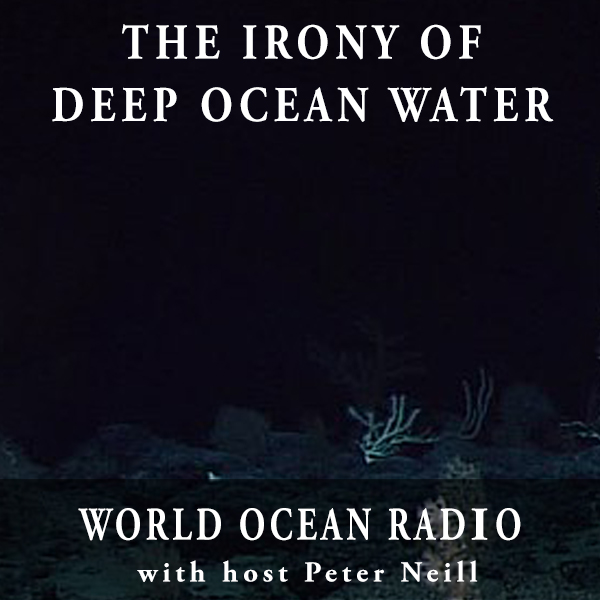 |
||
| WORLD OCEAN RADIO March 1 The Irony of Deep Ocean Water This week on World Ocean Radio we are discussing an emerging new phenomenon called the Global Deep Ocean Water Market and the food industry companies that are extracting salt water from the ocean depths, desalinating, trading as deep ocean water futures, and packaging for distribution and sale. |
||
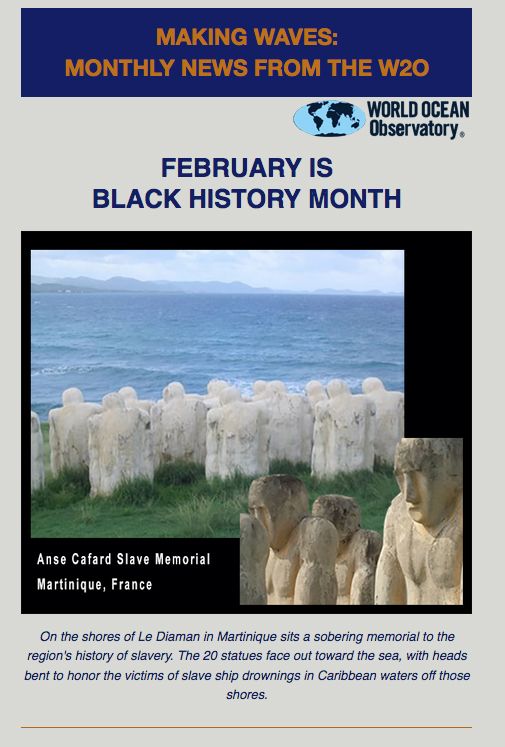 |
||
|
Making Waves: News from W2O In this issue: - A sobering memorial on the shores of Martinique |
||
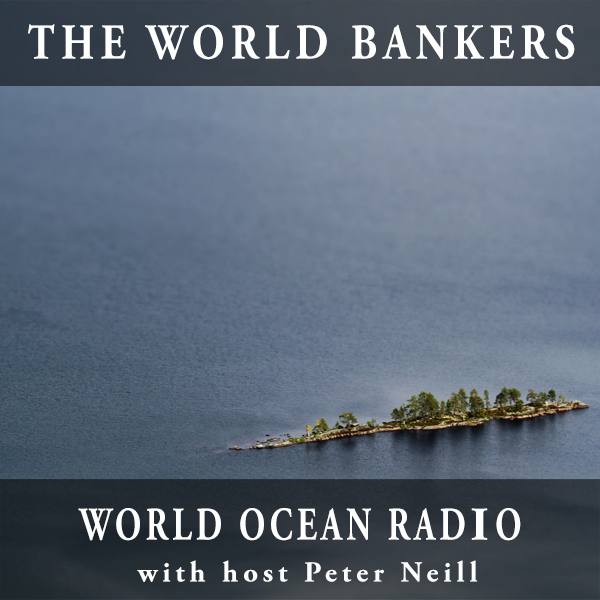 |
||
| WORLD OCEAN RADIO February 22 The World Bankers The World Bank and the International Monetary Fund have long been the cogs turning the wheels of global economics, driving infrastructure growth and economic development while often supporting the exploitation of natural resources and ignoring the social consequences of poverty, displacement, and disruption. Some have argued that the World Bank and the IMF have outlived their purpose, no longer effective as tools for the future. This week we're discussing the Global Environment Facility (GEF), a little known agency that finances large international projects with demonstrated financial outcomes that are progressive and sustainable. |
||
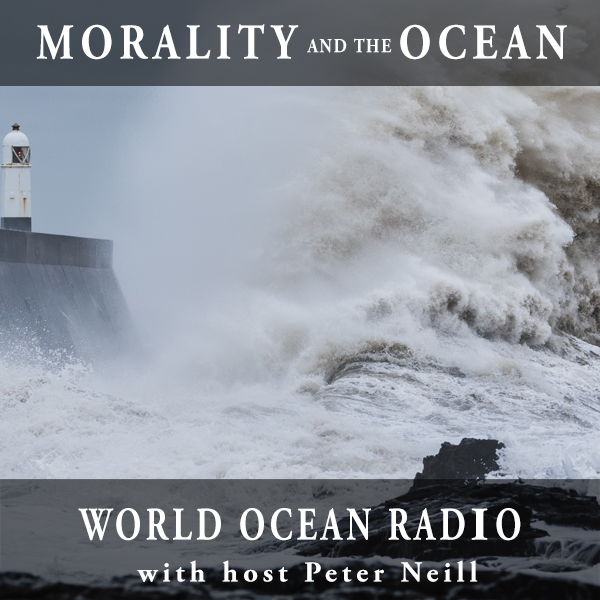 |
||
| WORLD OCEAN RADIO February 14 Morality and the Ocean This week on World Ocean Radio: reflections on the morality of nature and the ocean. How do we change the consequences of our actions, and take responsibility for what we have done to create the world we find ourselves in? Is it time for a bit of moral neutrality to return to a more accommodating, natural state? |
||
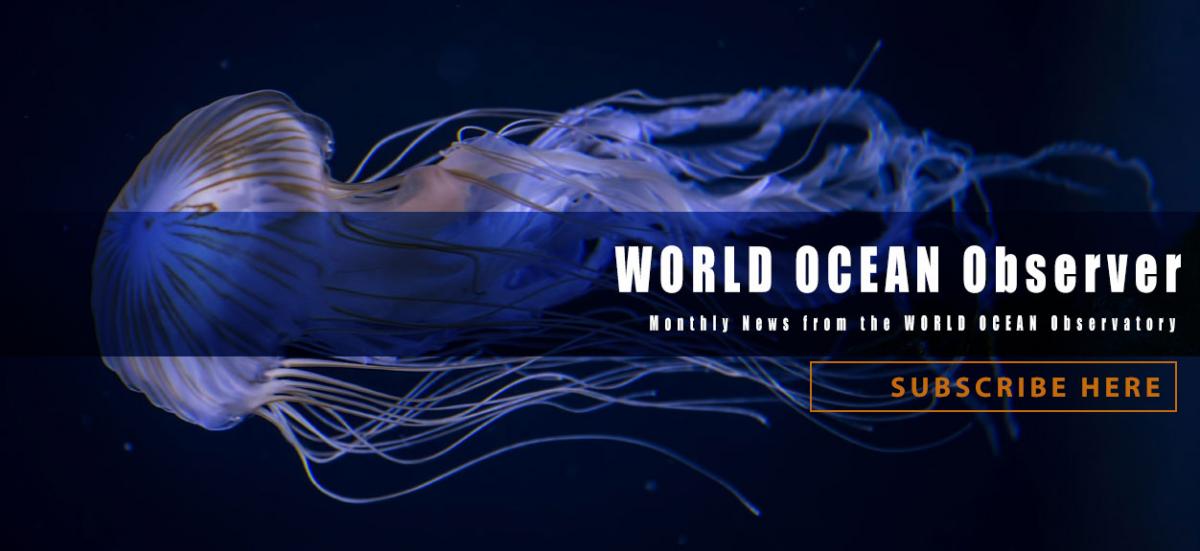 |
||
| Subscribe to Making Waves: Monthly News from the W2O: http://eepurl.com/cu4hov | ||
|
|
||
|
|
||
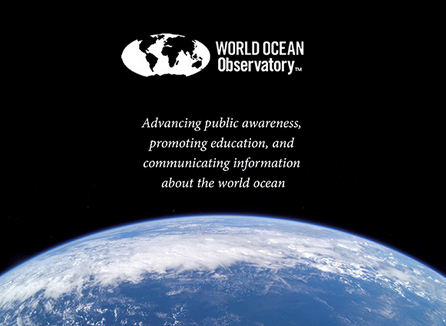 |
||
| MAKING WAVES January Newsletter of the W2O In this issue: - A Special Thanks to Our Supporters - World Ocean Radio in January - Collaborator Profile: New England Ocean Cluster - World Ocean Curriculum Catalog: Educational Content Resources - Our Ocean Space: Network Exchange for Students & Educators Not a subscriber? Sign up today |
||
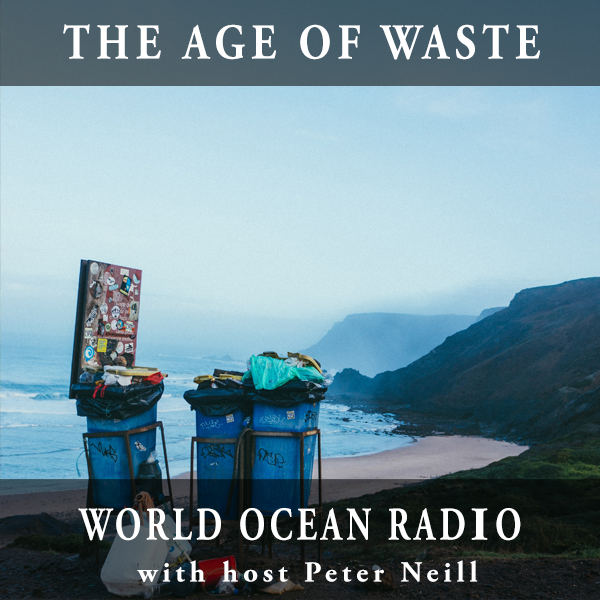 |
||
|
WORLD OCEAN RADIO |
||
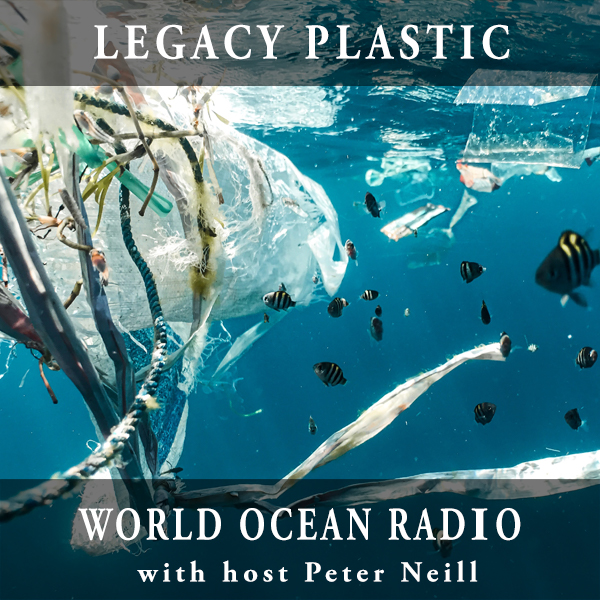 |
||
|
WORLD OCEAN RADIO This week on World Ocean Radio we're discussing recent reporting on the impact of deteriorated plastic waste and the ways that it has invaded our waterways, our oceans and our bodies. If we never made another piece of plastic again, are we able to ever be free of the damage plastic has already done worldwide? Can it be reversed? Are we even trying? |
||
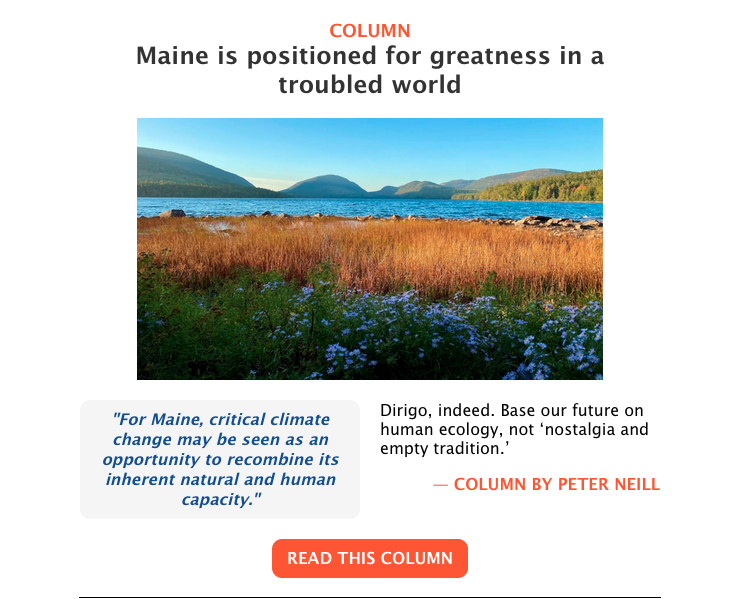 |
||
| January 17 For Maine, critical climate change may be seen as an opportunity to recombine its inherent natural and human capacity. Guest column in The Maine Monitor, a fantastic tool to aggregate all the best reporting and investigative journalism from local papers, radio stations and other media for the most interesting, pertinent news and information about Maine. |
||
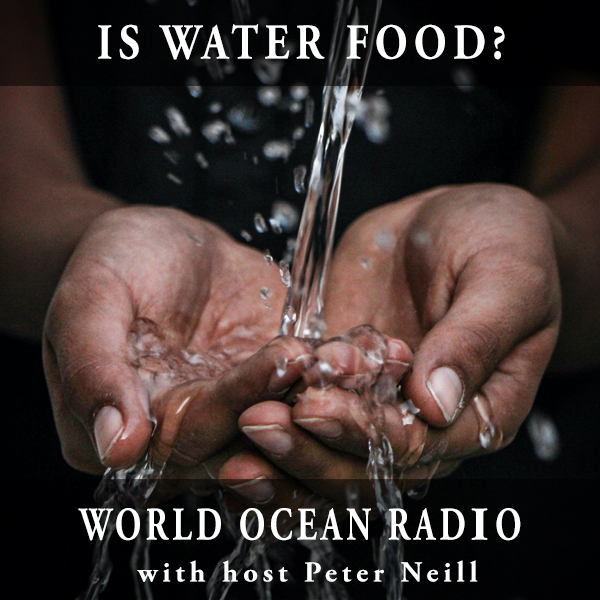 |
||
|
WORLD OCEAN RADIO In this episode of World Ocean Radio we weigh in on the debate of water as food. Many are certain that it is not because it does not have the same essential nutrients as food, while other maintain that it is. Is water food? We say it is--food for the soul. |
||
 |
||
|
WATER IS EVERYTHING Watch at http://youtu.be/C8FJonXohzQ |
||
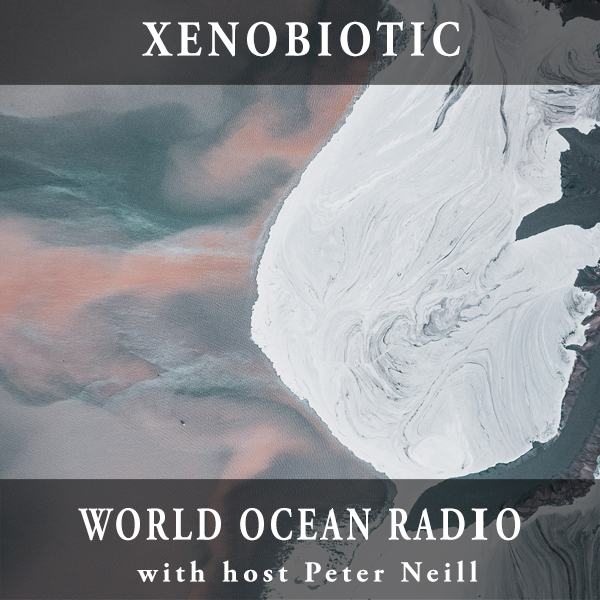 |
||
|
WORLD OCEAN RADIO This week on World Ocean Radio we introduce listeners to a word many may have never heard before: xenobiotic--defined as a chemical substance found within an organism that is not naturally produced or expected to be present--often referred to as a pollutant. Dioxins and polychlorinated biphenyls, carcinogens, drugs, food additives, fertilizers, hydrocarbons, plastics, pesticides, sewage--all manner of human-driven interventions from our interactions here on earth. Are we turning the world into a xenobiotic dump? Is there another way? |
||
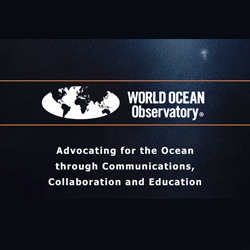 |
||
| MAKING WAVES December Newsletter of the W2O In this issue: - World Ocean Radio - Collaborator Profile: Schmidt Ocean Institute - Running Out of Time: A Conversation with Rob Johnson of the Institute for New Economic Thinking - Download our app - World Ocean Forum - Support W2O this year Not a subscriber? Sign up today |
||
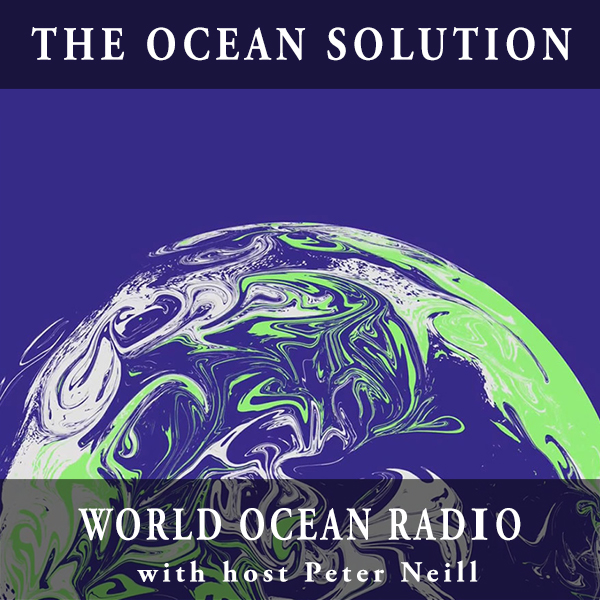 |
||
|
WORLD OCEAN RADIO This week on World Ocean Radio, we're discussing the final declaration of the climate pact post-COP26, in which the ocean was finally acknowledged as the intangible link between climate and biodiversity, and recognition of the need for integration of ocean-based actions into mandates and work plans. For the first time, the ocean is finally included in discussions about our climate future. While this is a start, it's too little. We argue that we must dare to envision a dramatic restructuring of law and focus that envisions the ocean as the blueprint for all further action. |
||
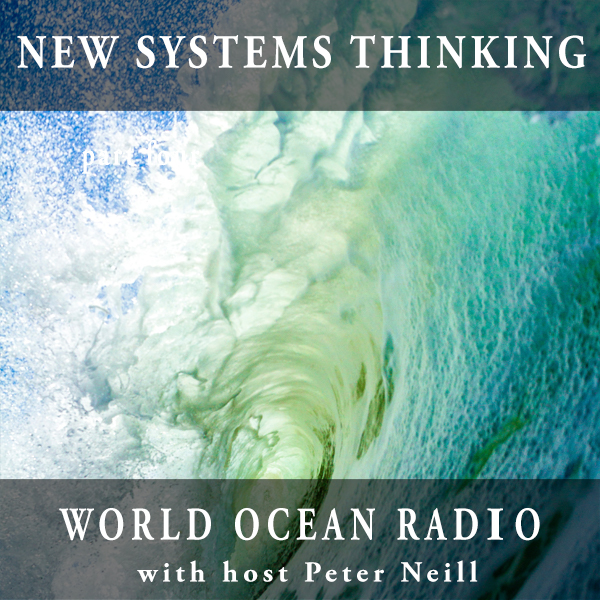 |
||
|
WORLD OCEAN RADIO This week on World Ocean Radio: new systems thinking offers alternatives to failing structures and behaviors. As food, energy and water are the three aspects most relevant to future survival, we argue that we must examine the innovations that pertain to each: aquaculture, renewable energy and desalination--to create an integrated, self-supporting new system that is key to a sustainable future. |
||
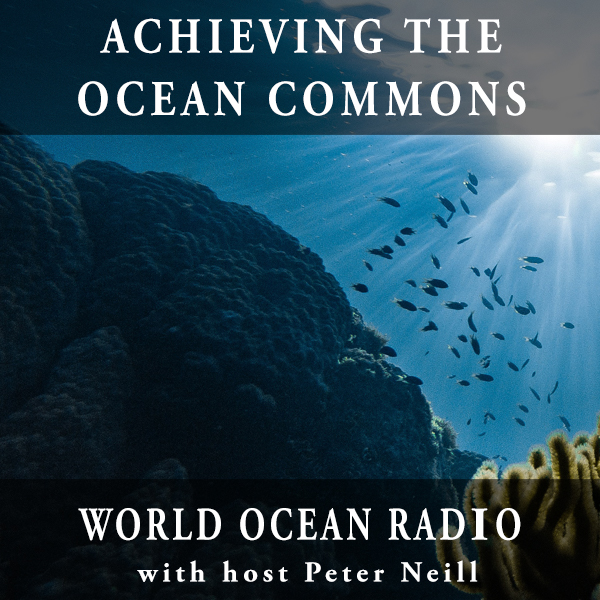 |
||
|
WORLD OCEAN RADIO How do we govern and manage the ocean inside and outside of national jurisdiction in order to use it responsibly and assure its long-term potential? How do we collectively affirm the transformational change required to meet the conditions and challenges we face worldwide? This week we seek answers in a recent article published in "Proceedings of the US National Academy of Science" that suggest principles for change and action required to sustain the value of the ocean now and for the future. |
||
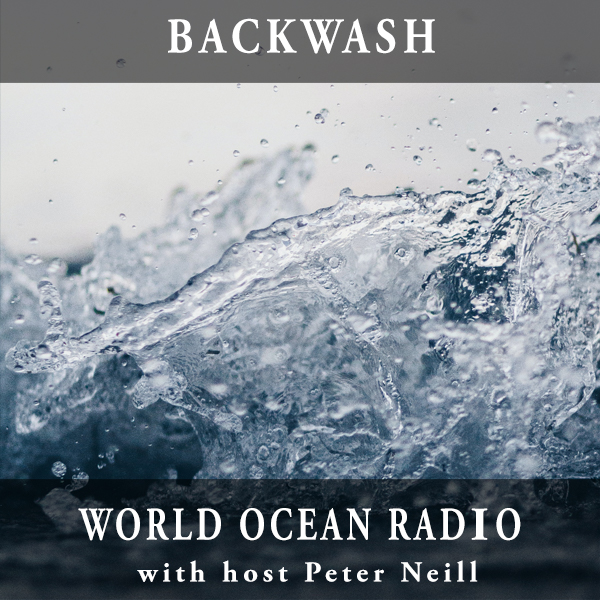 |
||
|
WORLD OCEAN RADIO In this episode we're defining "backwash" as the movement of water for filtration, for desalination, and for clearing of debris and toxins, and we're discussing methods that clean and protect Nature, using the strategies of bio-remediation to detoxify and cleanse against the human-caused destruction of natural systems. |
||
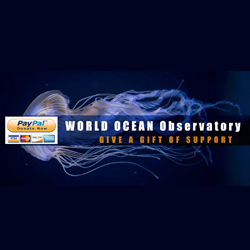 |
||
| Making Waves: Consider a Gift of Support In this issue: The W2O has become a demonstrable, effective voice for the ocean, innovating and promoting solutions, informing and mobilizing friends, neighbors, and strangers, and continuing to champion the sea that connects all things. Please consider a gift of support this fall. We will use it well. THANK YOU. Subscribe to our monthly e-news at: http://eepurl.com/cu4hov |
||
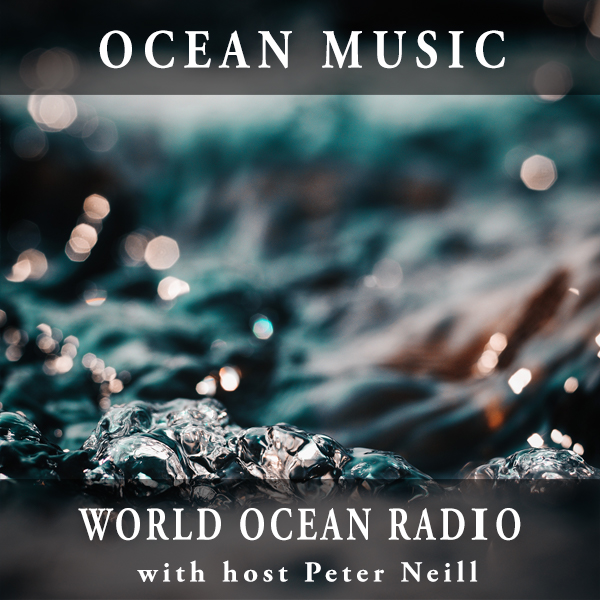 |
||
|
WORLD OCEAN RADIO In this episode of World Ocean Radio we take listeners to the shore, to be reminded of the importance of silence, solitude and renewal in our lives, and of the healing power of the ocean--or water in any form--that is there for us, if and when we choose to stop and listen. |
||
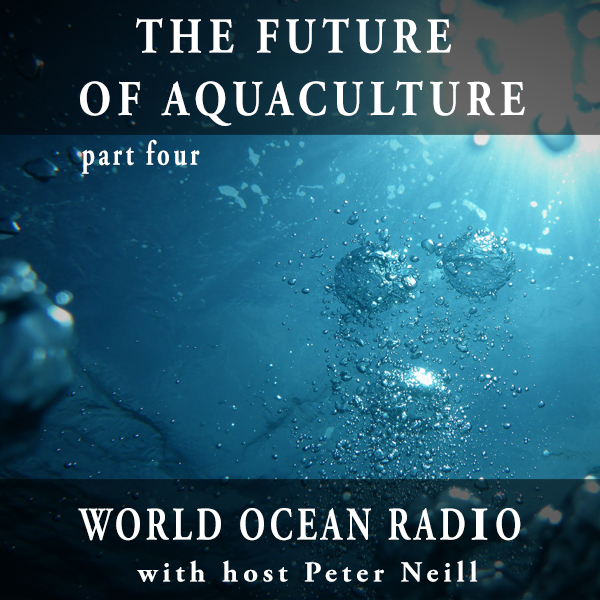 |
||
|
WORLD OCEAN RADIO In this brief series we have explored technologies, initiatives and other advancements for aquaculture with the power to improve efficiency and safety as a positive contribution to our future food supply and global health. This week represents the fourth and final installment of the series, focusing on the broader view of the word "aquaculture"—Water plus Culture—the universal source and guiding influence for our lives that will nurture and sustain us into the future if we can recognize and protect its significance for every aspect of our being. |
||
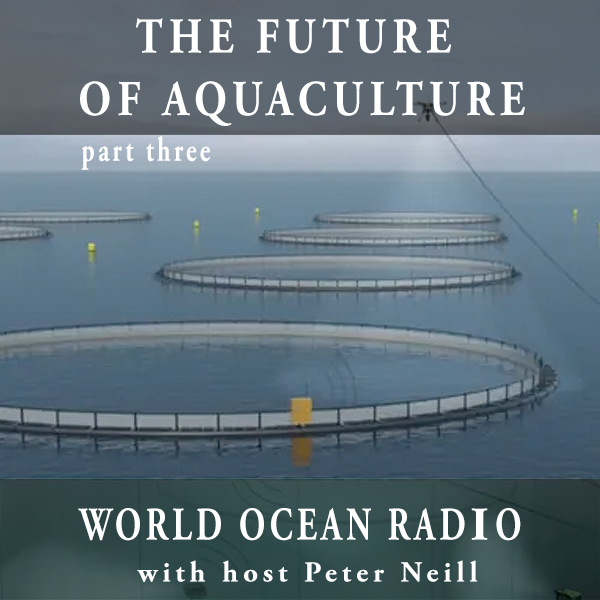 |
||
| WORLD OCEAN RADIO October 25 The Future of Aquaculture, part three In this brief series we're exploring disruptive technologies for aquaculture, specific initiatives and other advancements to improve efficiency and safety as a positive contribution to our future food supply and global health. This week we are discussing the challenges to aquaculture, the perils of some new unmanned technologies on the horizon, the pros and cons of offshore systems, and the spectrum of alternative projects that could alleviate the typical pitfalls of offshore aquaculture. |
||
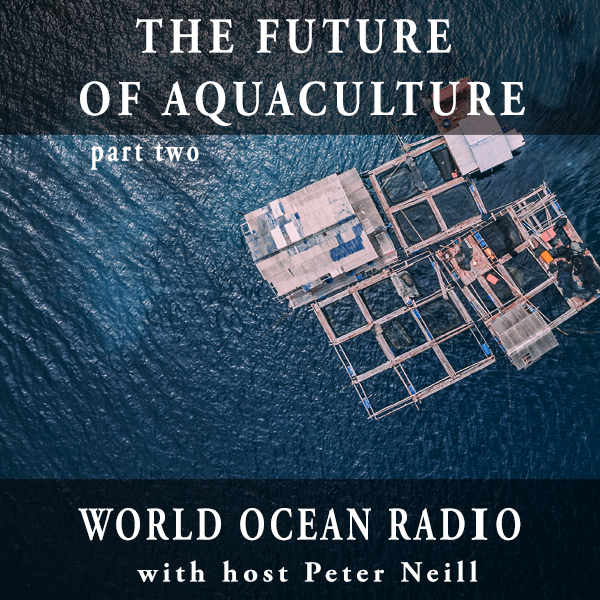 |
||
| WORLD OCEAN RADIO October 18 The Future of Aquaculture, part two In this brief series we're exploring disruptive technologies for aquaculture, specific initiatives and other advancements to improve efficiency and safety as a positive contribution to out future food supply and global health. This week we are acknowledging some of the improvements made by the aquaculture industry in terms of feed, antibiotics, waste, disease, off-shore structures, water treatment, quality control, and other factors that have in the past turned public interest and support for aquaculture toward misunderstanding and opposition. |
||
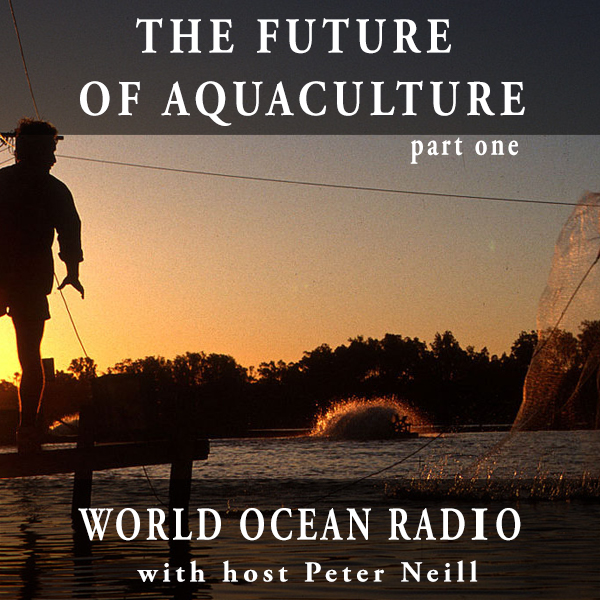 |
||
| WORLD OCEAN RADIO October 11 The Future of Aquaculture, part one For the next few weeks on #WorldOceanRadio we are exploring disruptive technologies for #aquaculture, specific initiatives & other advancements to improve efficiency & safety as a positive contribution to future food supply. |
||
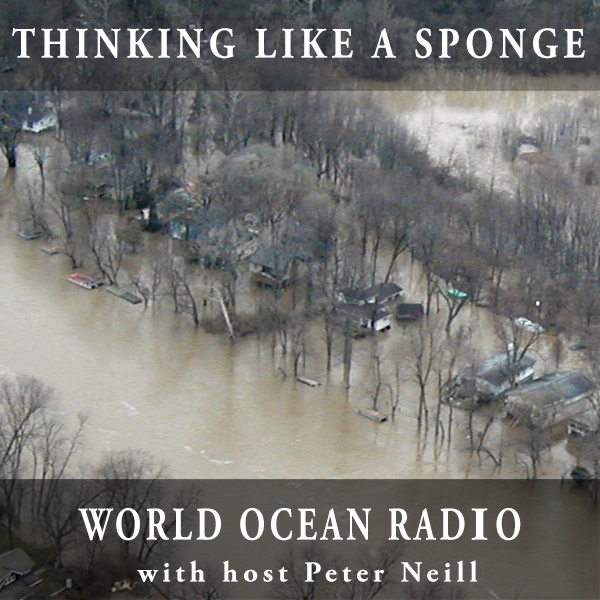 |
||
| WORLD OCEAN RADIO September 20, 2021 Thinking Like a Sponge Intense weather events are calling attention to not just local but worldwide water crises caused by climate. Coastal inundation, community disruption, dislocation and recovery are problems that we seem increasingly unable to withstand. This week on World Ocean Radio: the Danish Hydraulic Institute and their experiments with the concept of "sponge cities", a revolutionary planning tool to integrate urban design with water management strategies such as ground conditions, road and construction patterns and more, to create responses to rapidly changing coastal conditions. |
||
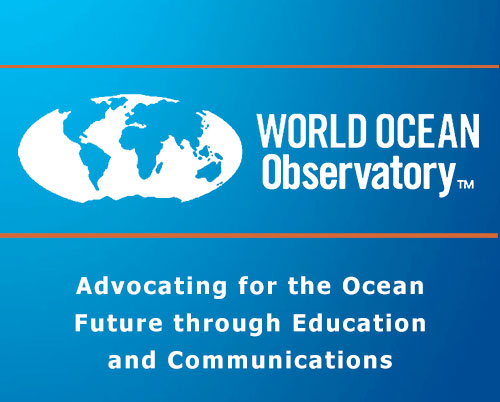 |
||
|
Making Waves: |
||
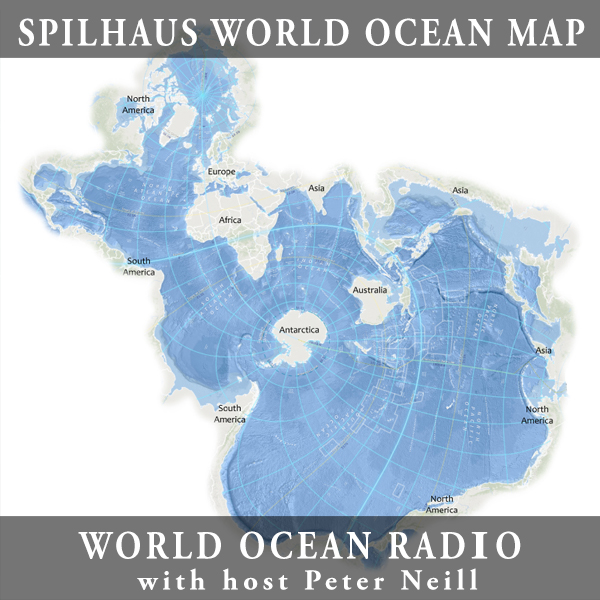 |
||
| WORLD OCEAN RADIO September 13, 2021 Spilhaus World Ocean Map Visualization is a powerful tool for understanding, beyond data, opening our minds and enabling transformative change through a new way of seeing. This week we're discussing the Spilhaus World Ocean Map, a projection of earth centered on Antarctica that makes the ocean the focus of an astonishing worldview, pushing the land to the outer edges of the square and re-organizing our global geography around the true natural systems of the world ocean. |
||
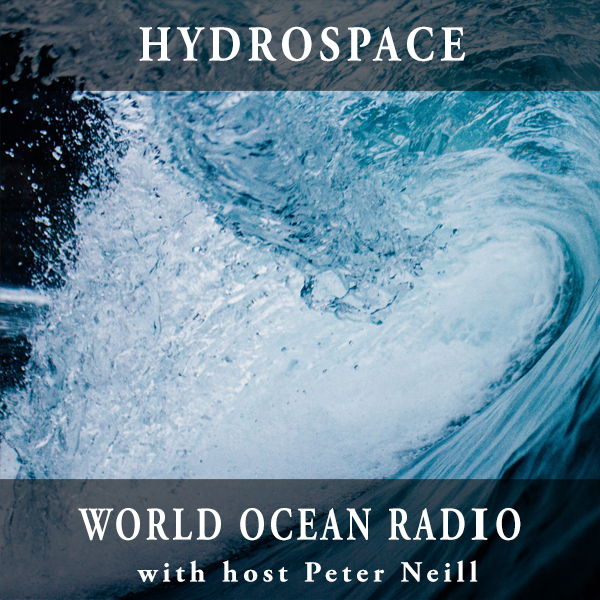 |
||
| WORLD OCEAN RADIO Hydrospace September 7, 2021 This week we are discussing hydrology, the "hydrospatial" perspective, and the importance of multi-dimensional analyses and visualizations for planning and decision-making that break down the artificial disciplinary boundaries of science to allow for comprehensive inclusion of multiple perspectives that better inform understanding of complex ocean systems for international goals and objectives. |
||
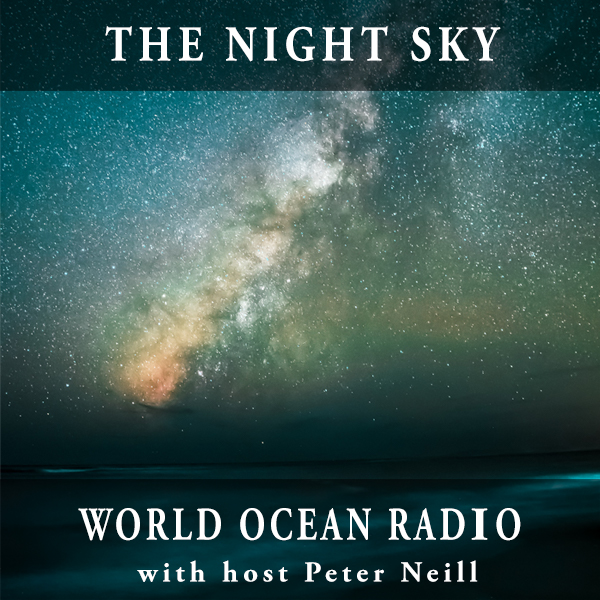 |
||
| WORLD OCEAN RADIO The Night Sky August 30, 2021 This week we're looking to the night sky, to ponder the wonder contained therein and to explore the danger of polluting it forever in the name of modern navigation and instant communications worldwide. |
||
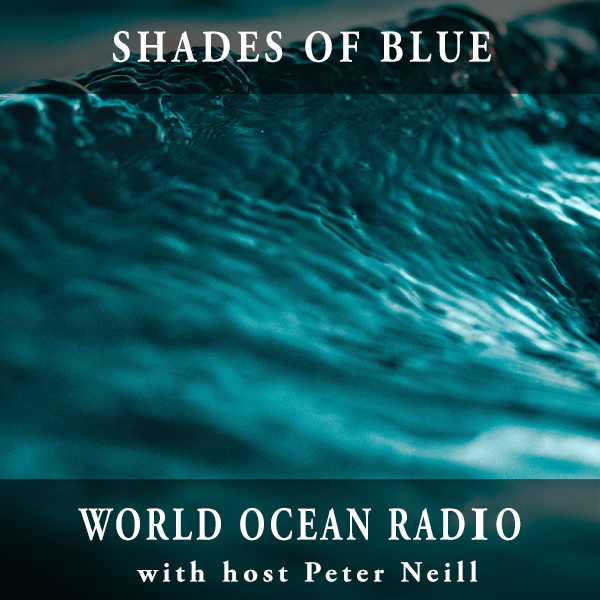 |
||
| WORLD OCEAN RADIO Shades of Blue August 23, 2021 This week on World Ocean Radio we reflect on "blue" and the profound stages of meaning beyond the color of the sea and sky to encompass depth, stability, wisdom, faith, truth, redemption, and the natural world. |
||
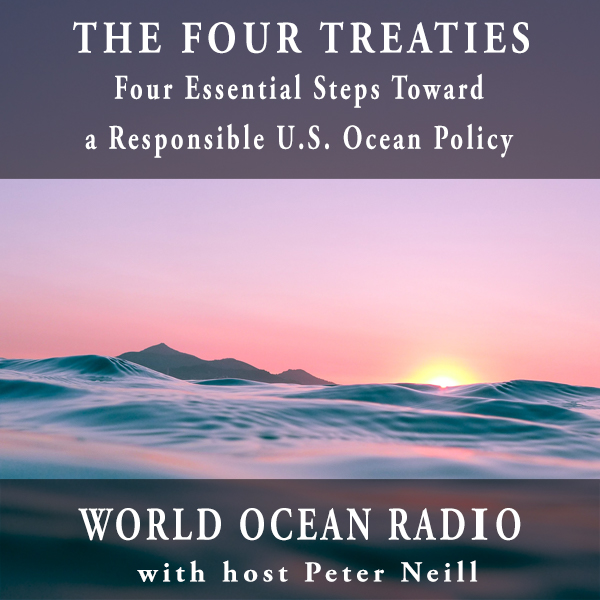 |
||
| WORLD OCEAN RADIO The Four Treaties Four Essential Steps Toward a Responsible U.S. Ocean Policy August 16, 2021 International agreements are essential if we are to sustain natural resources as natural capital for our future. In this episode of World Ocean Radio we outline four major environmental treaties the United States never ratified—but should. |
||
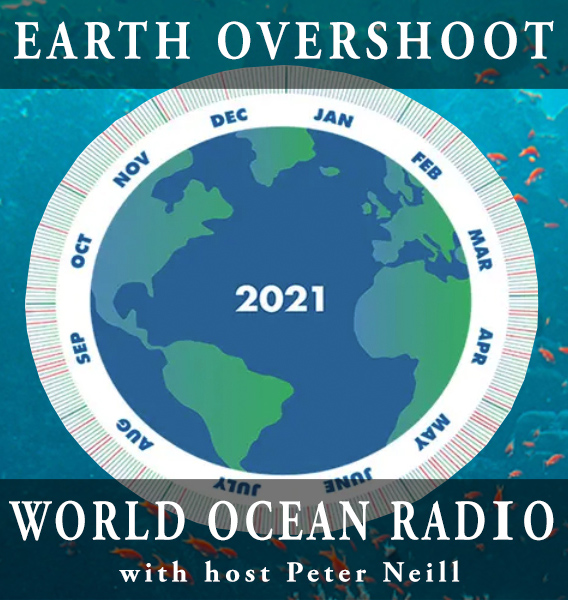 |
||
| WORLD OCEAN RADIO Earth Overshoot 2021 August 9, 2021 This week we're discussing Earth Overshoot Day 2021 which landed on July 29th, meaning we are running an ecological deficit between now and the end of the year. The calculation is clear: we are consuming more than the earth can produce, overshooting our sustainable capacity by exhausting the resources upon which we all depend. |
||
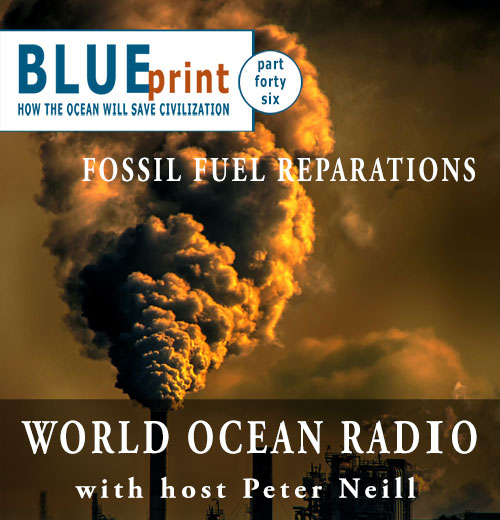 |
||
| WORLD OCEAN RADIO FOSSIL FUEL REPARATIONS August 2, 2021 This week: an idea to confront the big polluters of the fossil fuel industry for their indifference to redress, by attaching reparations for the exploitation of natural resources over time, thereby providing incentives for new, non-polluting technologies of energy generation, storage and distribution toward a more sustainable future for our climate and ourselves. |
||
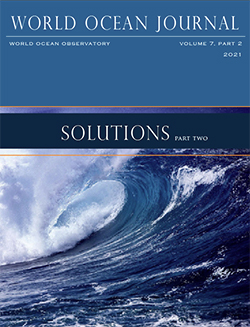 |
||
|
WORLD OCEAN JOURNAL In our last edition we began to assemble and profile many initiatives and projects that best express a forward-looking alternative perspective and plan of action. We discovered that one issue was not enough to describe the many new ideas and processes that are coming on line as revolutionary steps, each perhaps small in itself, but collectively representing a wave of ingenuity and determination that must command our awareness, financial investment, and public and private engagement from this day forward. And so we provide for readers here a Part 2 to Volume 7—more ocean solutions for a sustainable ocean future. If you wish to begin at the beginning, Volume 7, Part One can be downloaded here. Print-on-demand available for all volumes of WOJ. Contact us FMI. |
||
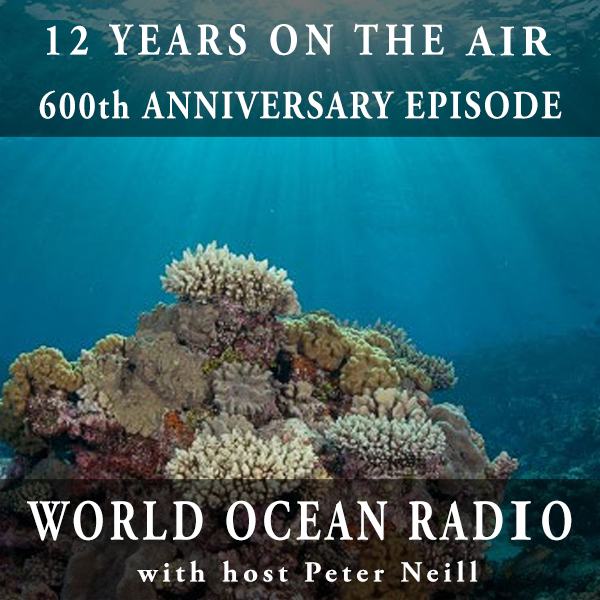 |
||
| WORLD OCEAN RADIO 12 YEARS ON THE AIR July 23, 2021 This week marks the 600th episode of World Ocean Radio. It was in 2009 that the show first began with encouragement from WERU-FM Community Radio in Blue Hill, Maine. Today World Ocean Radio is heard via countless college and community radio stations around the United States and in select regions in New Zealand, Hong Kong and Africa. Thanks to the rise in social media these last number of years we are now broadcast worldwide, reaching millions of listeners connected by the sea. In this week's special anniversary edition we look back to the state of the ocean when this show first began, where we are now, and where we could be headed if we so choose to employ the many tools at our disposal to sustain our water planet. |
||
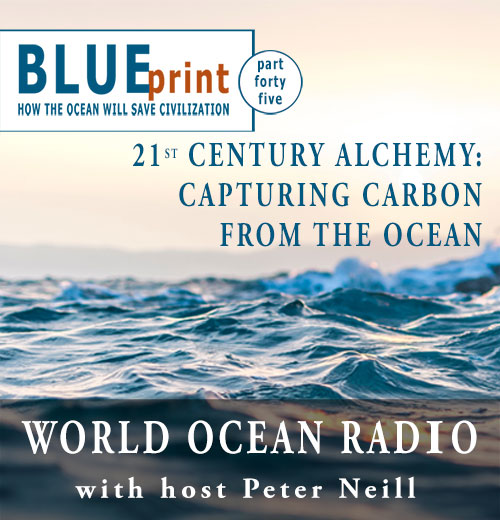 |
||
| WORLD OCEAN RADIO 21st CENTURY ALCHEMY July 19, 2021 This week marks the 600th episode of World Ocean Radio. It was in 2009 that the show first began with encouragement from WERU-FM Community Radio in Blue Hill, Maine. Today World Ocean Radio is heard via countless college and community radio stations around the United States and via internet radio around the world, reaching millions of listeners connected by the sea. In this week's special anniversary edition we look back to the state of the ocean when the show first began, where we are now, and where we could be headed if we so choose to employ the many tools at our disposal to sustain our water planet. |
||
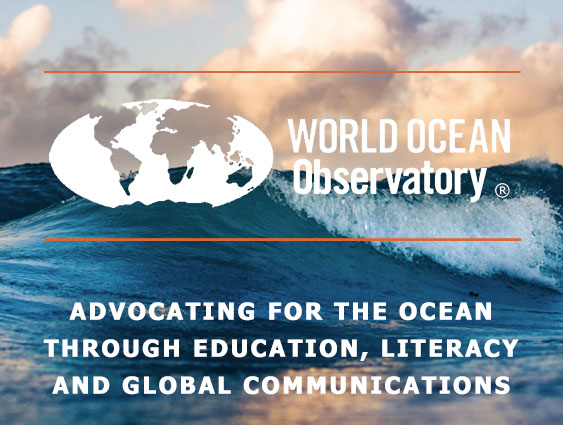 |
||
|
MAKING WAVES: Not a subscriber? Sign up today |
||
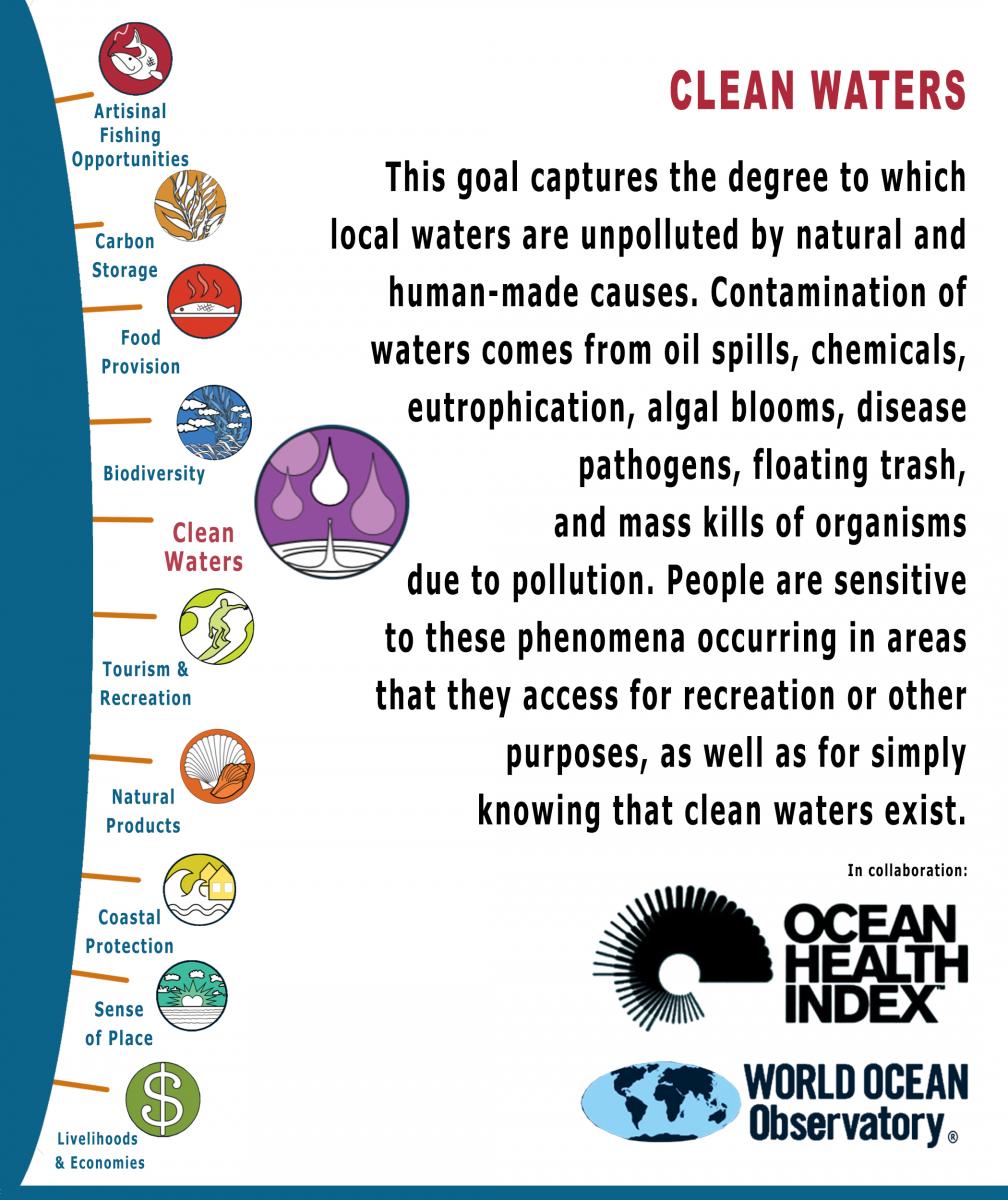 |
||
|
OCEAN HEALTH INDEX This goal captures the degree to which local waters are unpolluted by natural and human-made causes. People value marine waters that are free of pollution and debris for aesthetic and health reasons. Contamination of waters comes from oil spills, chemicals, eutrophication, algal blooms, disease pathogens (e.g., fecal coliform, viruses, and parasites from sewage outflow), floating trash, and mass kills of organisms due to pollution. People are sensitive to these phenomena occurring in areas that they access for recreation or other purposes as well as for simply knowing that clean waters exist. |
||
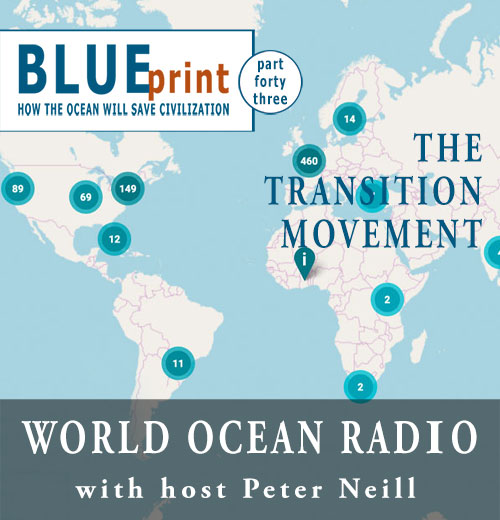 |
||
| WORLD OCEAN RADIO THE TRANSITION MOVEMENT June 29, 2021 This week on World Ocean Radio: part 43 of the BLUEprint Series outlining a new and sustainable path forward with the ocean leading the way. In this episode we introduce listeners to The Transition Network, outlining some of their 1,150 global initiatives that reflect the principles and practical actions of community, sustainability, resilience, justice and change. You can learn even more about The Transition Network at transitionnetwork.org. |
||
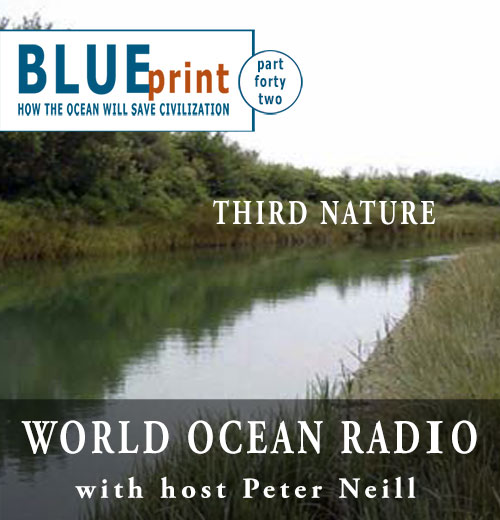 |
||
| WORLD OCEAN RADIO THIRD NATURE June 21, 2021 Since the origins of planet earth, through the foundation of civilization, to the exhausted land we live in today, we are faced with a Third Wave of Nature. If we can abandon the old paradigms, we can make the shift toward water--our watersheds, rivers, lakes and primarily coasts and ocean--the places we will turn for our energy, our fresh water, our food and all of the things that contribute to our sustainability and survival. |
||
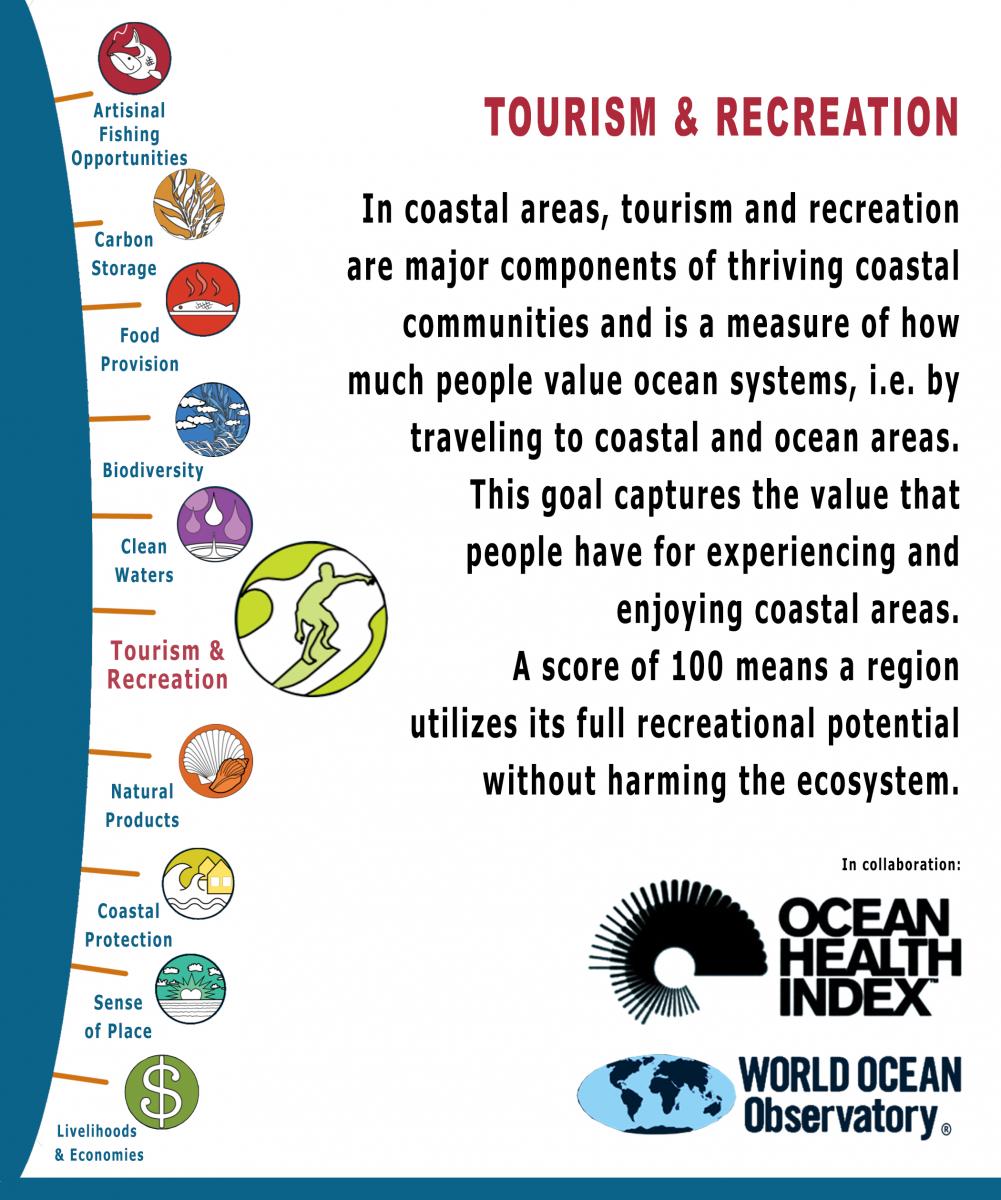 |
||
| OCEAN HEALTH INDEX TOURISM & RECREATION June 18, 2021 Tourism and recreation in coastal areas is a major component of thriving coastal communities and is a measure of how much people value ocean systems, i.e. by traveling to coastal and ocean areas. This goal is not about the revenue or livelihoods that are generated by tourism and recreation (that is captured in the livelihoods goal) but rather it captures the value that people have for experiencing and enjoying coastal areas. A score of 100 means a region utilizes its full recreational potential without harming the ecosystem. In collaboration with the Ocean Health Index our introduction to the OHI framework continues this week as we outline details of the matrix and the ten goals and sub-goals: those benefits that are delivered to humans, widely recognized for supporting well-being and sustaining ocean ecosystems. The OHI framework categorizes goals and sub-goals that represent ocean-derived benefits to humankind. |
||
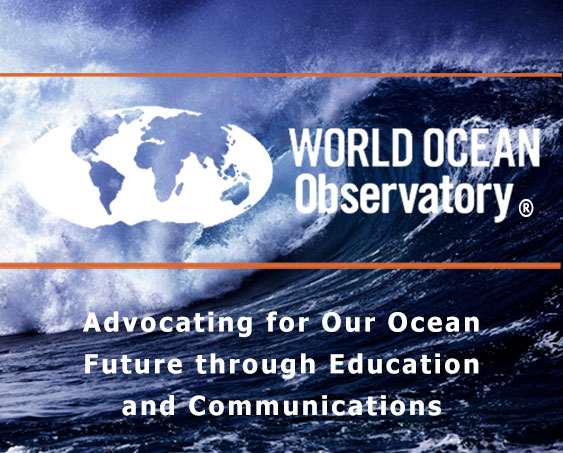 |
||
| MAKING WAVES June News from the World Ocean Observatory In this issue: - Maine-Based Collaborations: New England Ocean Cluster, Island Institute, Maine Monitor - New W2O Advisor: Marc Angélil - World Ocean Radio in May - Economist Group World Ocean Initiative - W2O App - Support W2O When You Shop: GreenH2O |
||
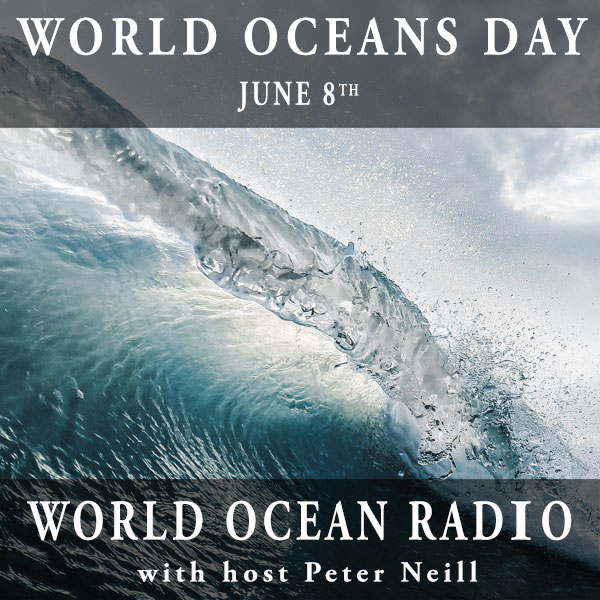 |
||
| WORLD OCEAN RADIO WORLD OCEANS DAY June 7, 2021 On this World Oceans Day--and every day--we at the W2O advocate for the health of the ocean through education, public connection and relentless communications. We hope you will take a moment on World Oceans Day to think about the ways that the ocean is influenced by you, and the ways that you are influenced by the ocean. Enjoy this week's episode of World Ocean Radio: a celebration of World Oceans Day. |
||
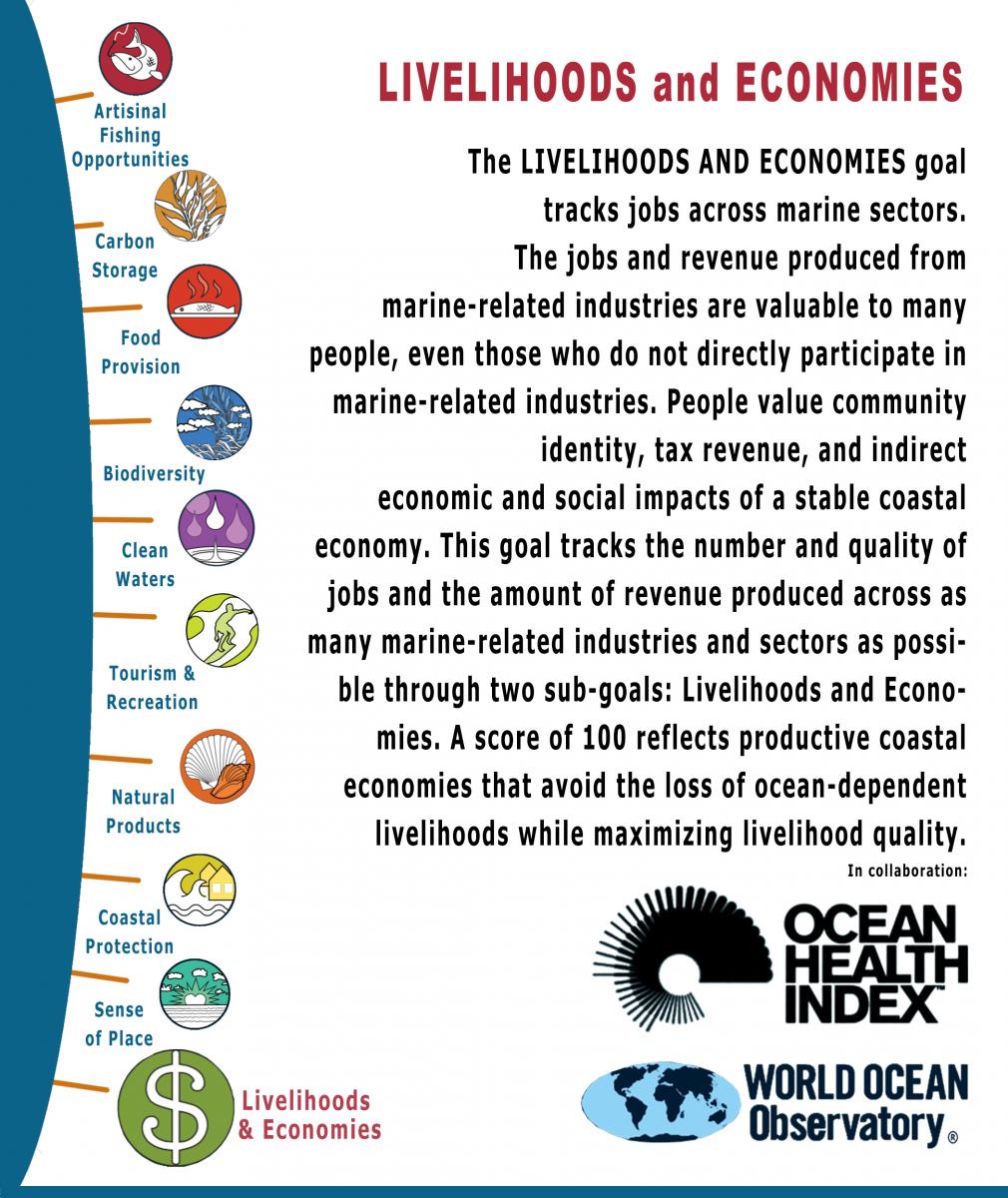 |
||
| OCEAN HEALTH INDEX LIVELIHOODS AND ECONOMIES June 6, 2021 As part of our collaboration with the Ocean Health Index we are introducing readers to the OHI framework. This week's highlighted goal is LIVELIHOODS and ECONOMIES. This goal tracks the number and quality of jobs and the amount of revenue produced across as many marine-related industries and sectors as possible through two sub-goals: Livelihoods and Economies. A score of 100 reflects productive coastal economies that avoid the loss of ocean-dependent livelihoods while maximizing livelihood quality. |
||
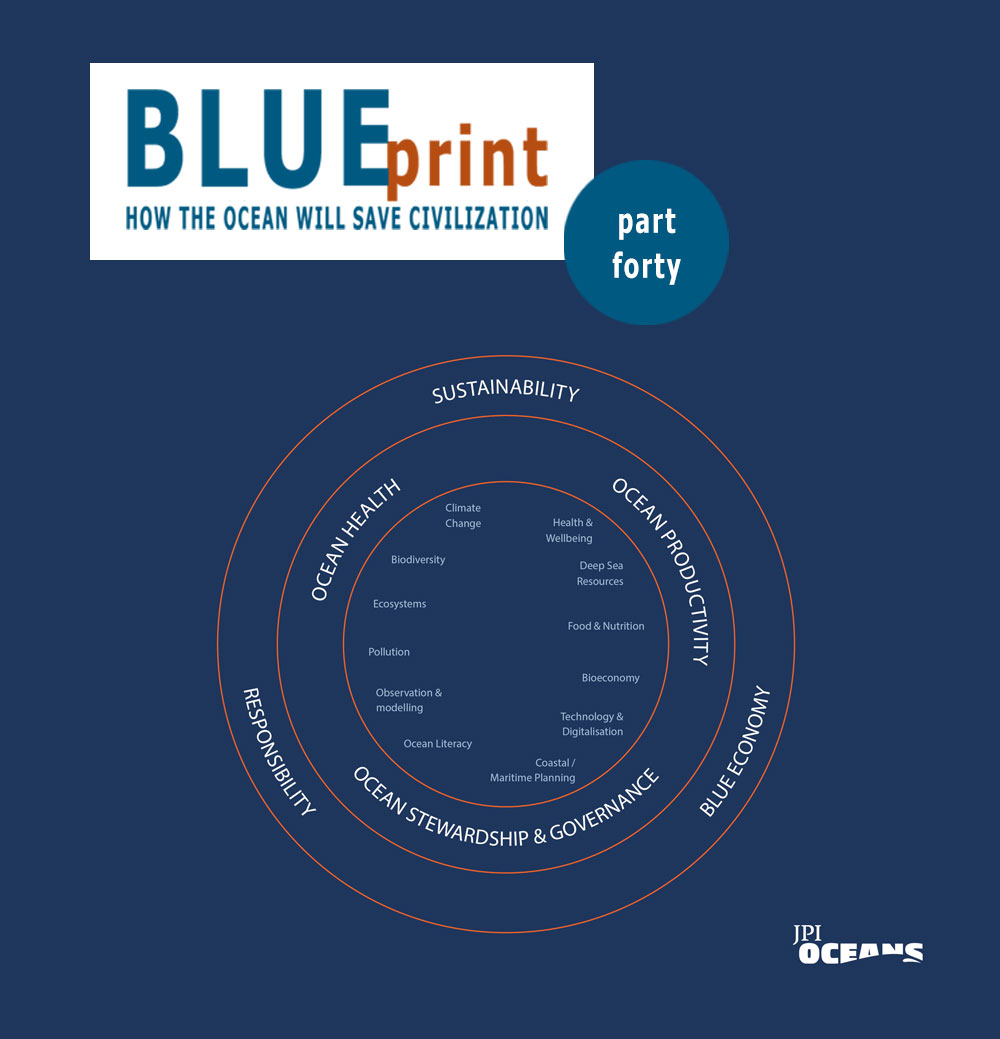 |
||
| WORLD OCEAN RADIO How to Implement the Blue Economy June 1, 2021 This week on World Ocean Radio, part 40 of the BLUEprint Series, host Peter Neill dives into the true meaning of the often over-used "blue economy" terminology and describes his recent discovery of a strategic initiatives portfolio conceived by JPI Oceans in Europe that strives to increase the impact of national investments in marine and maritime research and innovation. And he shares the values, goals and objectives that propose a structure around which specific investments could be made to achieve social and monetary return while achieving a commitment to sustainability and the ocean. |
||
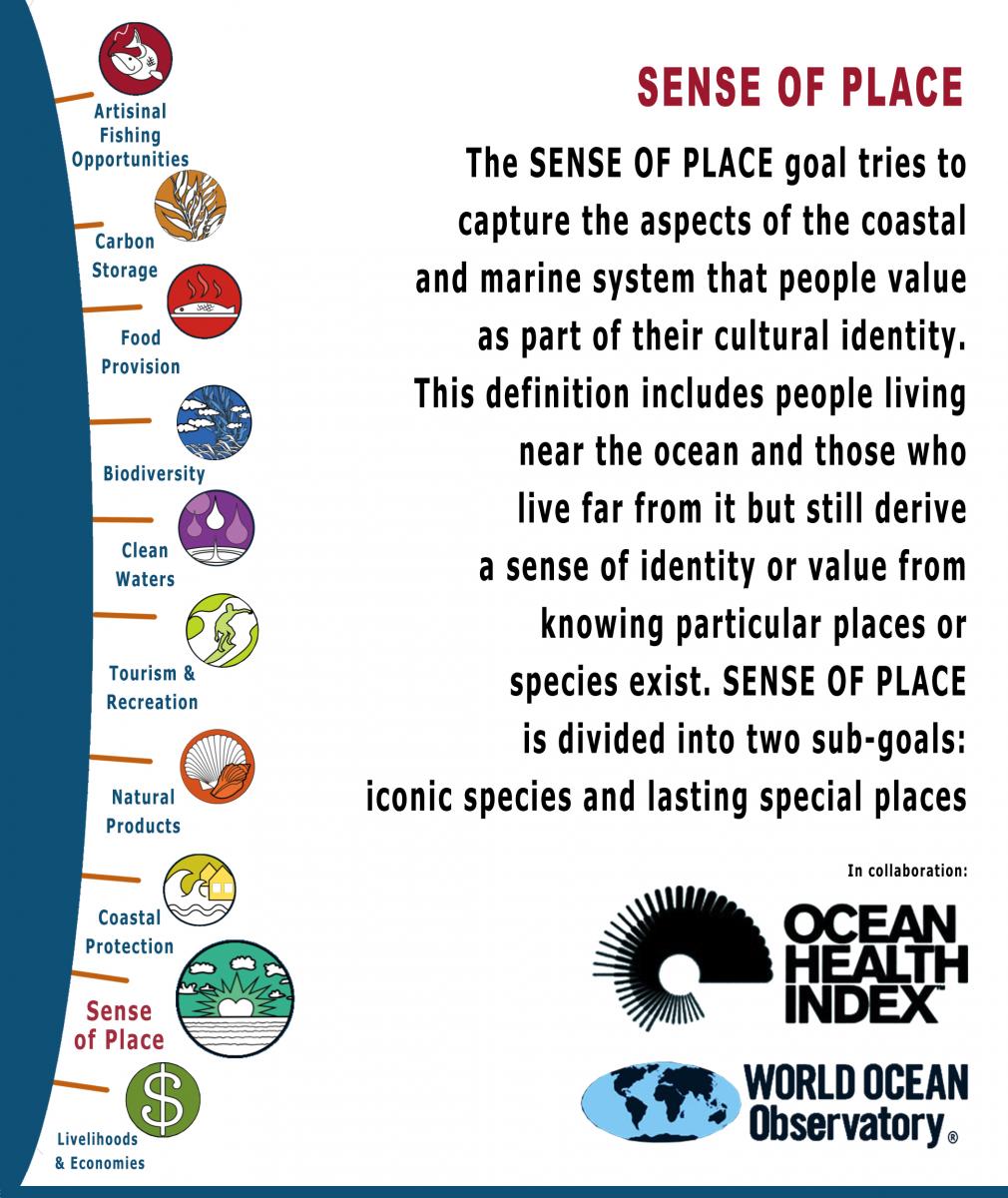 |
||
| OCEAN HEALTH INDEX SENSE OF PLACE May 24, 2021 As part of our collaboration with the Ocean Health Index we are introducing readers to the OHI framework. This week's highlighted goal is SENSE OF PLACE. This goal tries to capture the aspects of the coastal and marine system that people value as part of their cultural identity. This definition includes people living near the ocean and those who live far from it but still derive a sense of identity or value from knowing particular places or species exist. This goal is divided into two sub-goals: iconic species and lasting special places. |
||
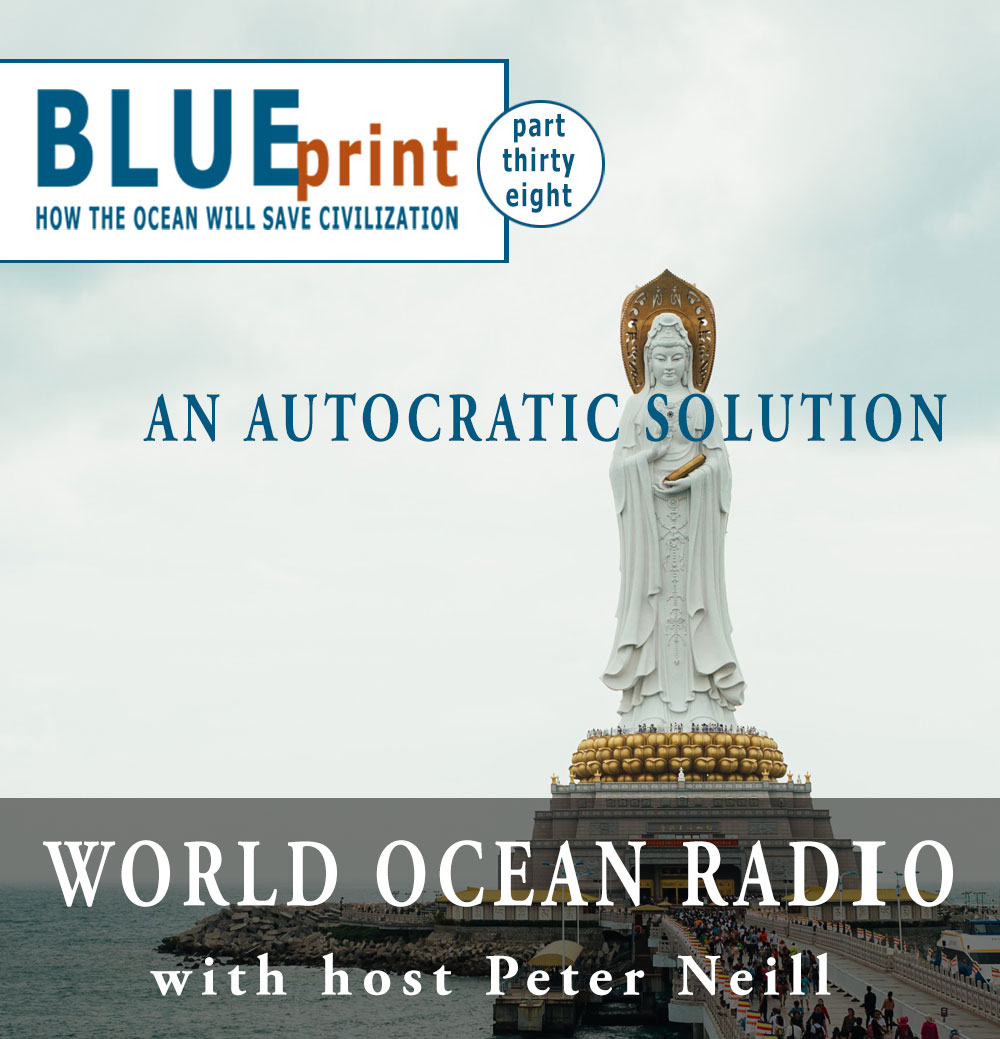 |
||
| WORLD OCEAN RADIO An Autocratic Solution May 18, 2021 In this episode, part thirty-eight of the multi-part BLUEprint series, we examine some statistics that show steps #China is taking to confront the #climate crisis--one of the only nations in the world whose government has recognized the realities of #climatechange and all of its manifestations as measured by environmental degradation, the corruption of land and #water, and the inevitable decline in economy and community, and the steps the nation has taken to develop policy, incentive, and frameworks toward #ecosystem health and #sustainability. |
||
 |
||
| MAKING WAVES May News from the World Ocean Observatory In this issue: - A Year of Partnership & Collaboration - World Ocean Journal: Solutions v2 coming soon - W2O Welcomes New Trustee - World Ocean Radio: BLUEprint Series - Support W2O with GreenH2O Rewards - Aqua/Terra: Reflections on the World Ocean - An App for the Ocean Subscribe today. We'll only email you once per month! http://eepurl.com/cu4hov |
||
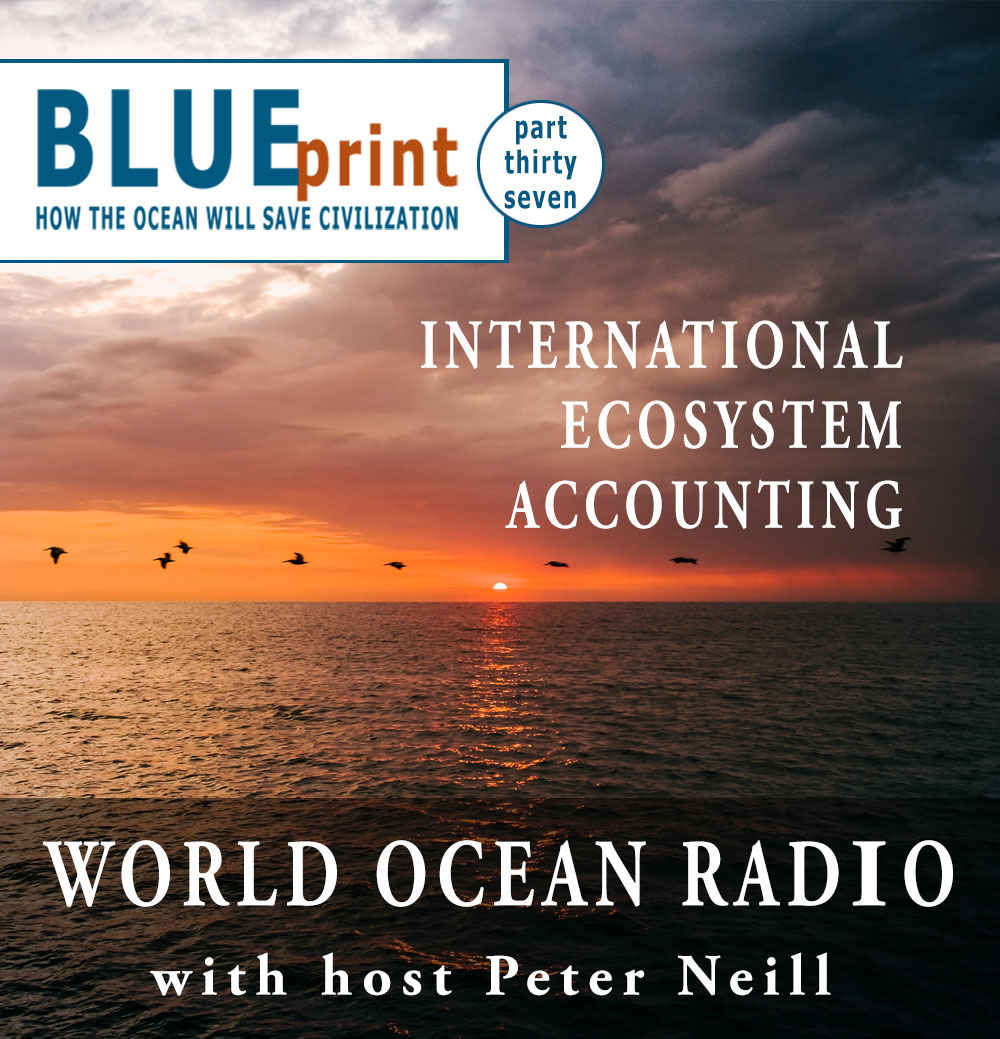 |
||
| WORLD OCEAN RADIO International Ecosystem Accounting May 10, 2021 In this episode we look at the United Nations World Ocean Assessment through the lens of ecosystem service analysis, the ways in which we view and value Nature, and some examples of projects based on ecosystem service accounting. |
||
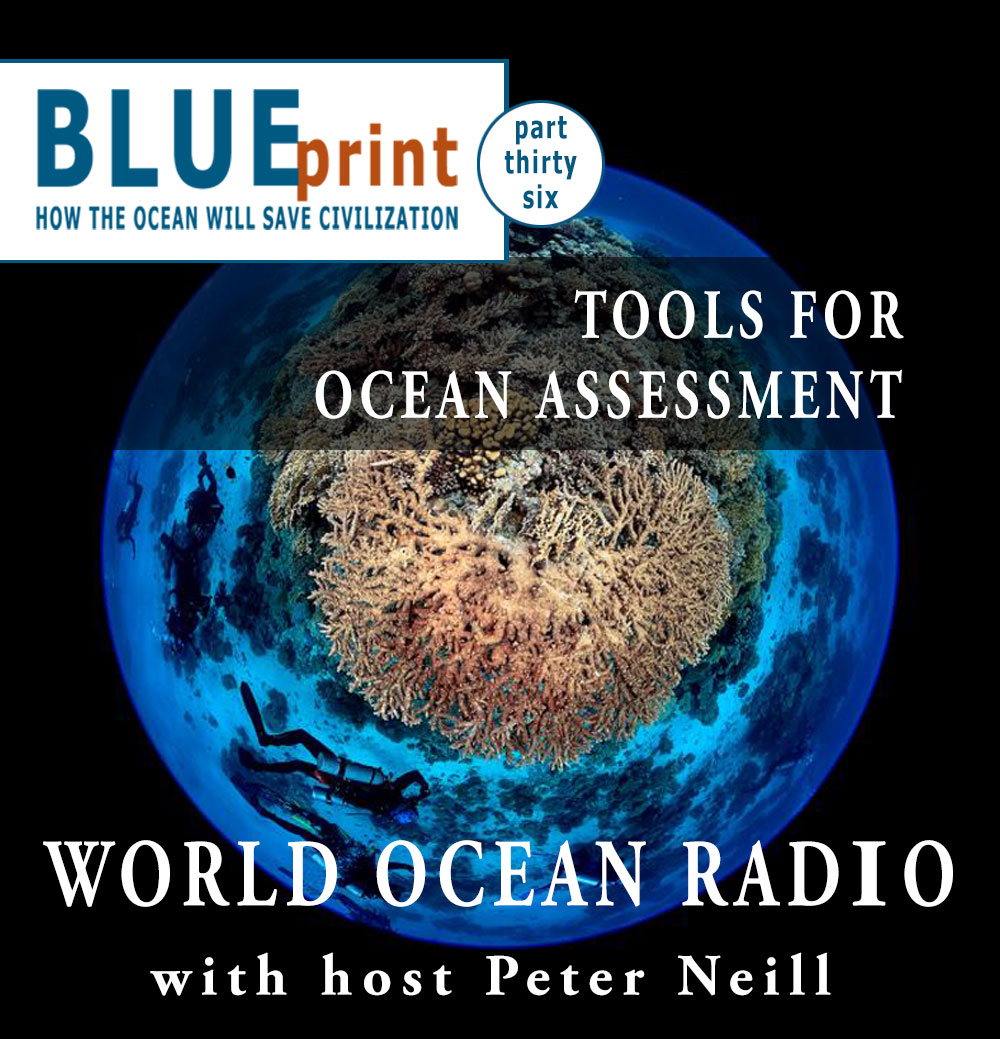 |
||
| WORLD OCEAN RADIO Tools for Ocean Assessment May 3, 2021 In this episode, part thirty-six of the multi-part BLUEprint series, we outline the key state of the ocean and ocean science take-aways from the recently published 2nd United Nations World Ocean Assessment, a report that looks at the social, environmental, demographic and economic trends, as well as a review of the integrated sustainable management of coasts and oceans as driven by science, technology and innovation. Additionally, we give credit to the Ocean Health Index, another metric for providing baseline measurements and updates toward ocean sustainability year by year. |
||
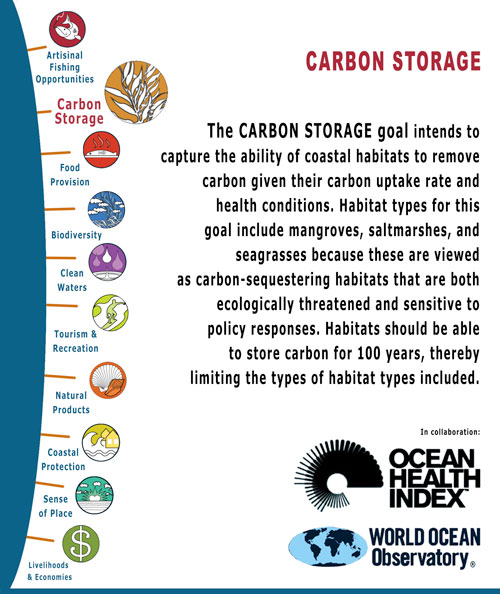 |
||
| OCEAN HEALTH INDEX CARBON STORAGE May 3, 2021 In our fifth week of collaborating with the Ocean Health Index, we are focusing on the goal of CARBON STORAGE. Understanding habitat carbon storage rates is an area of ongoing research. The capacity for habitats to store carbon varies, and depends on the morphology of plants in the system. Highly productive coastal wetland ecosystems (mangroves, salt marshes, seagrass) store substantially larger amounts of carbon than terrestrial forests and have the highest sequestration rates of any habitats on earth. They are also threatened by under-regulated coastal development but are amenable to restoration and conservation efforts. |
||
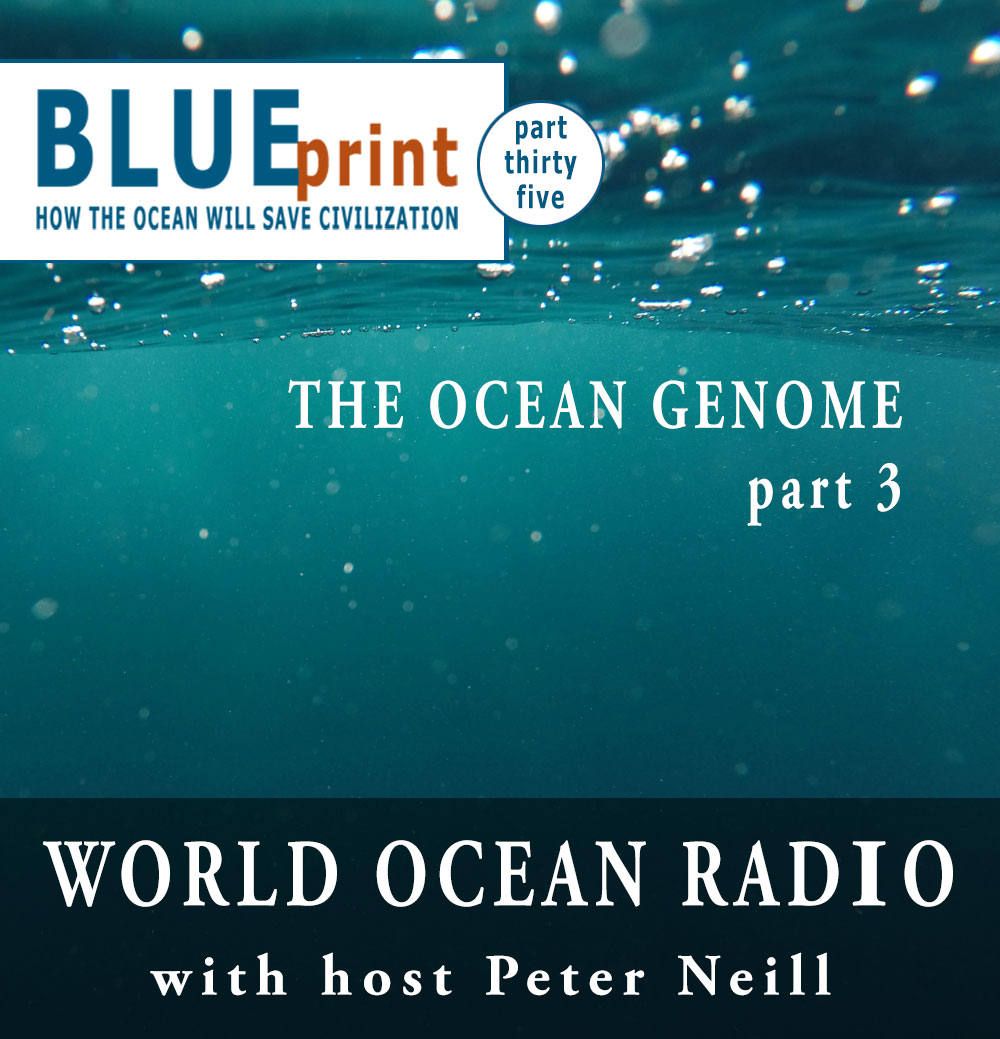 |
||
| WORLD OCEAN RADIO The Ocean Genome, part 3 April 26, 2021 This week, as part of our focus on new approaches and ideas to simplify our strategies for living sustainably on earth, we are continuing our discussion of the ocean genome with an outline of the global protections required if we are to equitably protect natural resources derived from the ocean. |
||
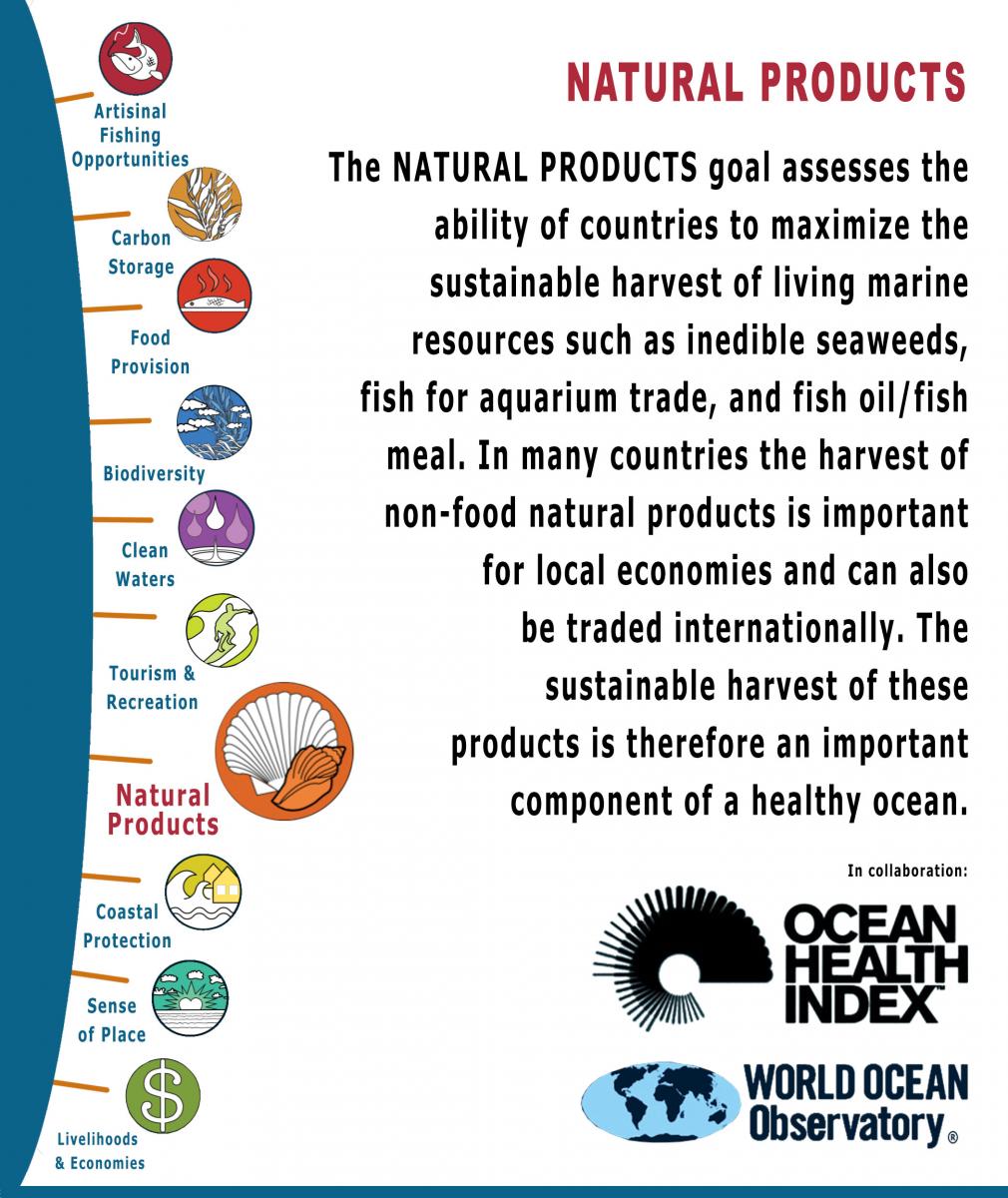 |
||
| OCEAN HEALTH INDEX NATURAL PRODUCTS April 23, 2021 In our fourth week of our new collaboration with the Ocean Health Index, we are introducing readers to the OHI framework by outlining details of the matrix and the ten goals and sub-goals--the benefits delivered to humans that are widely recognized for supporting human well-bring and sustainable ocean ecosystems. This week's highlighted goal is NATURAL PRODUCTS. Learn more. |
||
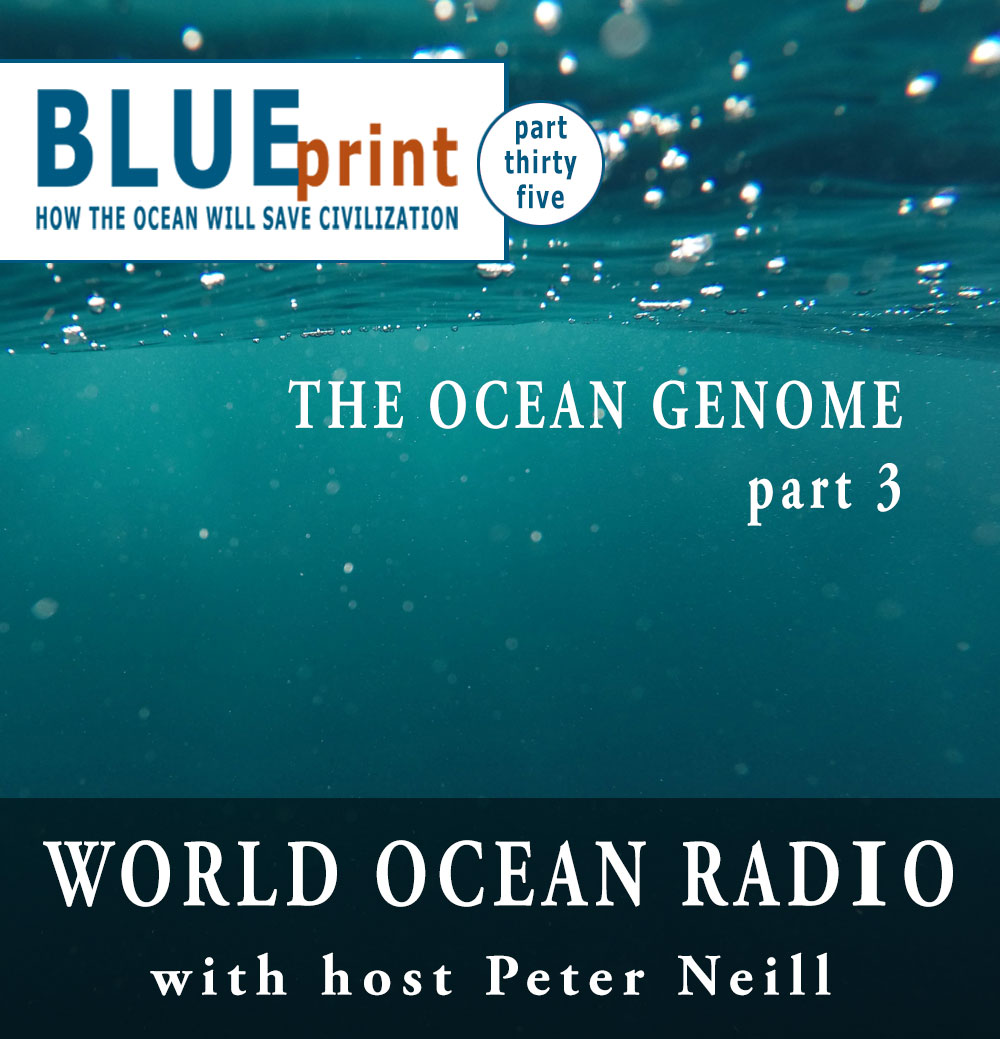 |
||
| WORLD OCEAN RADIO The Ocean Genome, part 2 April 19, 2021 This week, as part of our focus on new approaches and ideas to simplify our strategies for living sustainably on earth, we are continuing our discussion of the ocean genome as well as the commercial interests, applications and marine drug and health discoveries made and yet to be discovered. We also warn that marine protected areas remain vulnerable to limited enforcement and over-exploitation of their natural resources. |
||
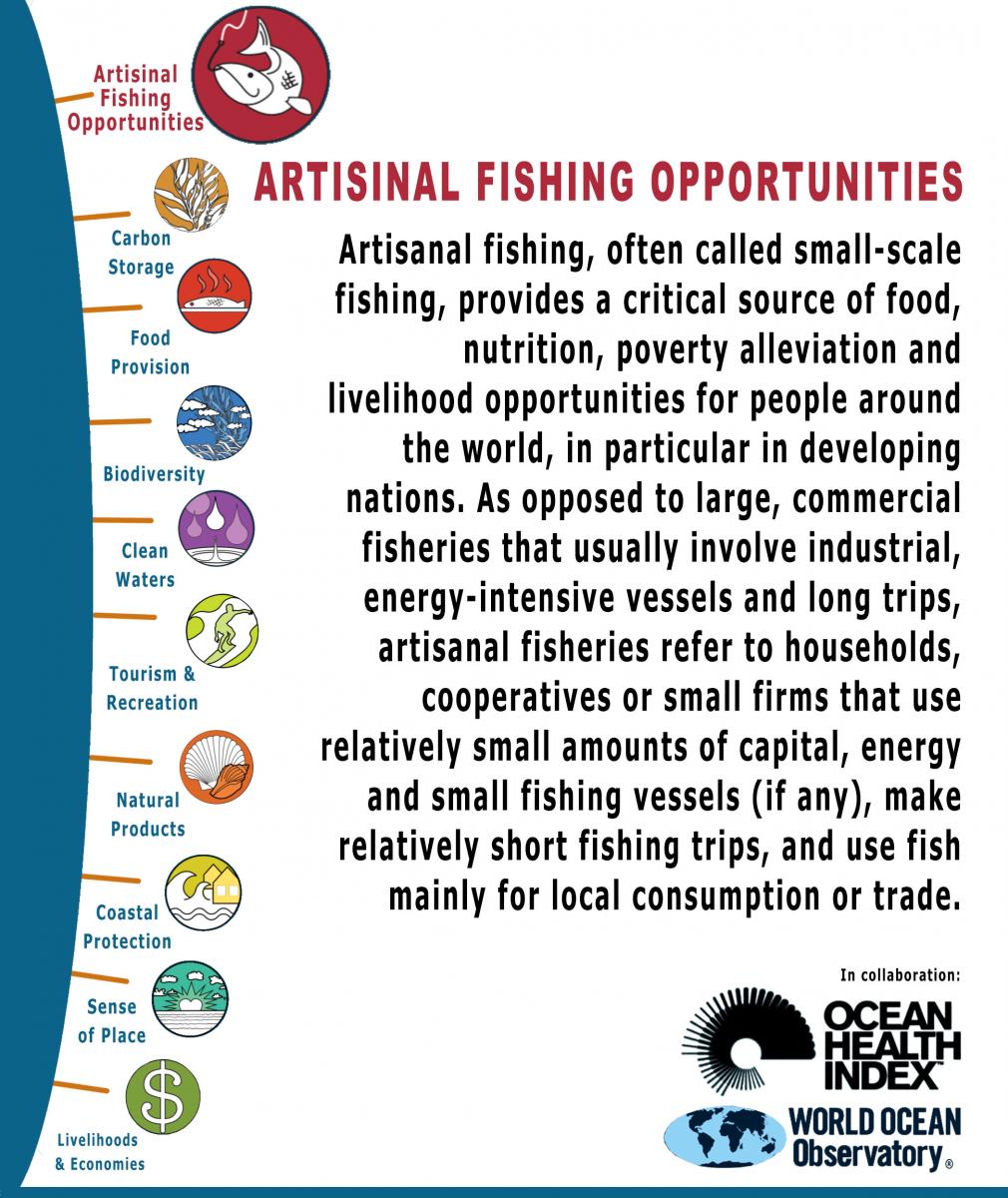 |
||
| OCEAN HEALTH INDEX ARTISINAL FISHING OPPORTUNITIES April 16 In our third week of our new collaboration with the Ocean Health Index, we are introducing readers to the OHI framework by outlining details of the matrix and the ten goals and sub-goals--the benefits delivered to humans that are widely recognized for supporting human well-bring and sustainable ocean ecosystems. This week's highlighted goal is ARTISINAL FISHING OPPORTUNITIES. Learn more. |
||
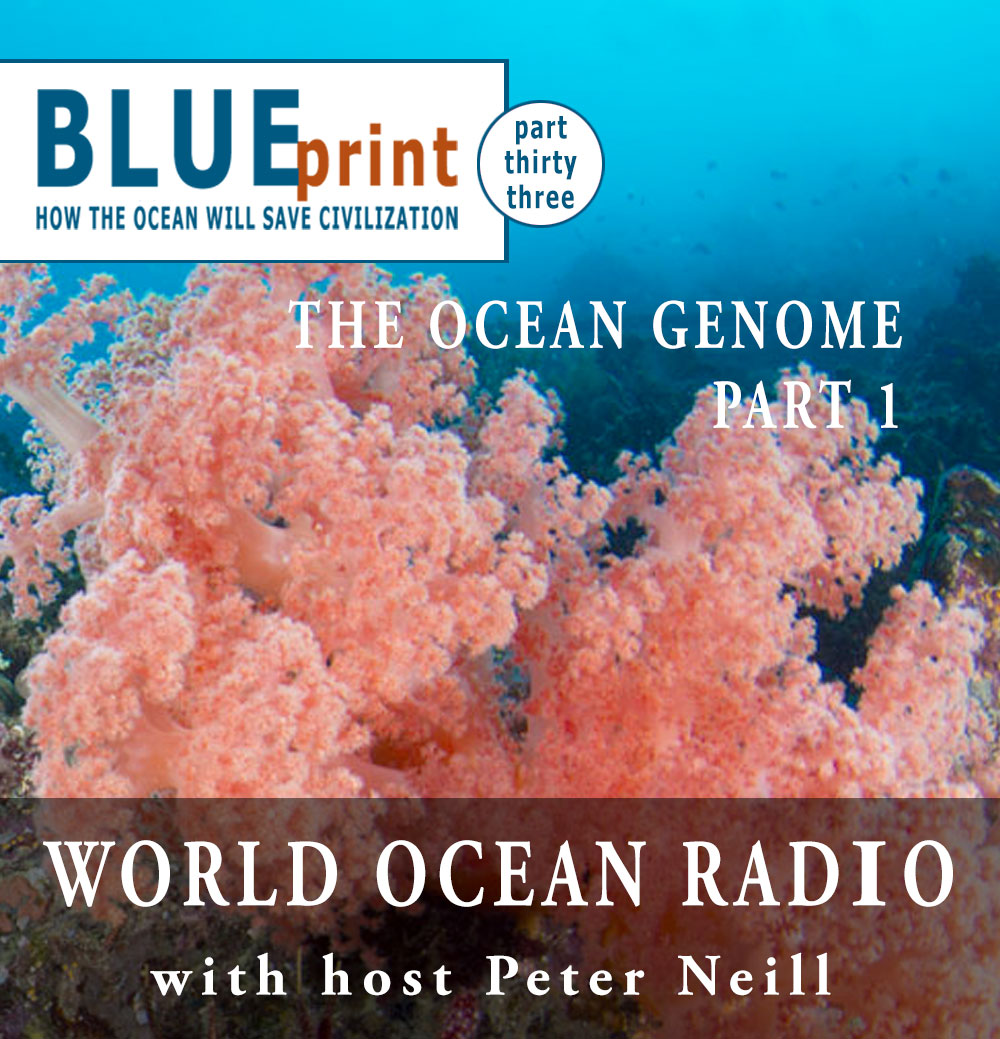 |
||
| WORLD OCEAN RADIO The Ocean Genome, part 1 April 12, 2021 This week on World Ocean Radio: part thirty-three of the multi-part BLUEprint series. This week, as part of our focus on new approaches and ideas to simplify our strategies for living sustainably on earth, we discuss RNA, DNA, the concept of the genome as an encyclopedic catalog for Nature as a way to provide guidance and explanations for how life works, and the various implications of eDNA on the ocean. |
||
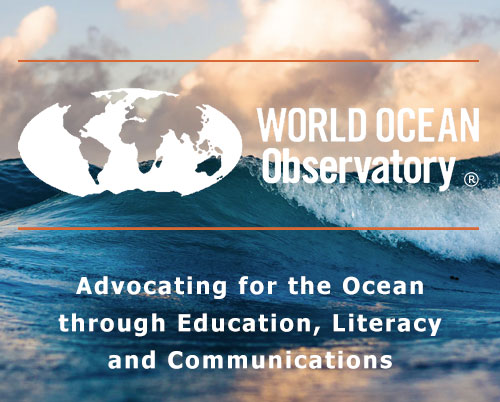 |
||
| MAKING WAVES April News from the World Ocean Observatory In this issue: collaboration with the Ocean Health Index; this week on World Ocean Forum; new curriculum resources: Ocean Curriculum Catalog; new app for the #ocean; World Ocean Radio BLUEprint series continues; Aqua/Terra early release. |
||
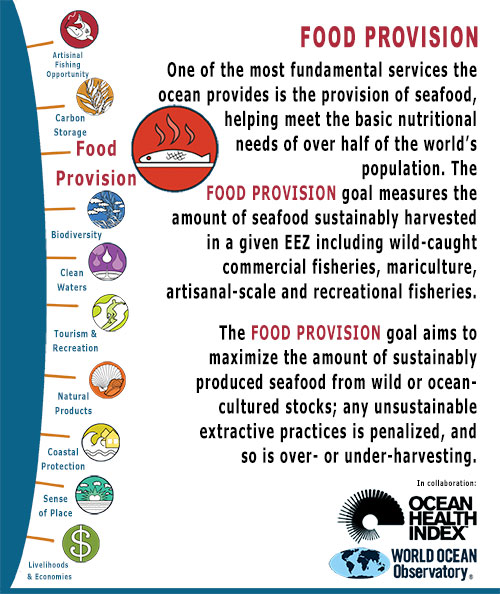 |
||
| OCEAN HEALTH INDEX Week 2: Food Provision April 9 The FOOD PROVISION goal aims to maximize the amount of sustainably produced seafood from wild or ocean-cultured stocks; any unsustainable extractive practices is penalized, and so is over- or under- harvesting. This goal does not aim to measure food security for the population of a given country, but instead measures the food provided from its waters. There are two sub-goals to FOOD PROVISION: Fisheries and Mariculture, which measure the amount of goods sustainably harvested from the sea for human consumption. LEARN MORE: |
||
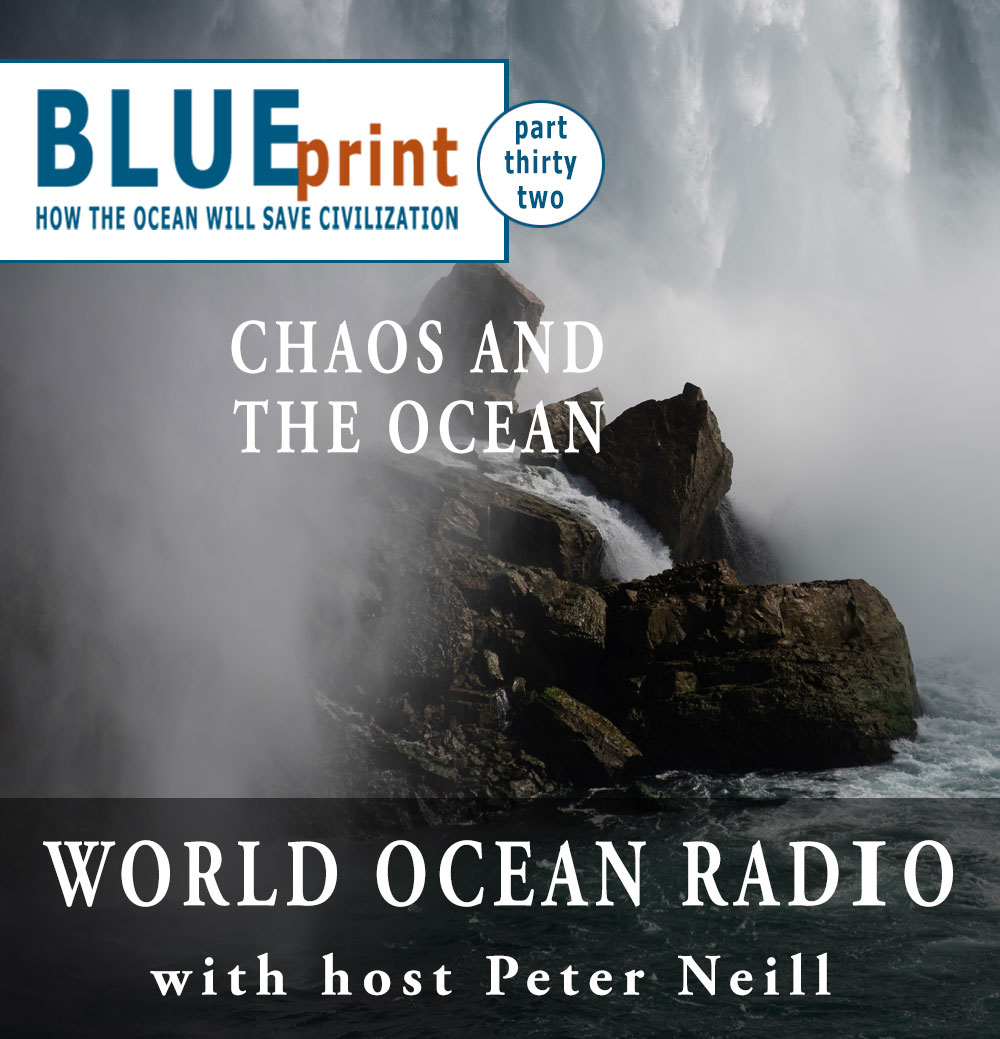 |
||
| WORLD OCEAN RADIO Chaos and the Ocean April 5, 2021 This week on World Ocean Radio: part thirty-two of the multi-part BLUEprint series. In the next few weeks we'll introduce new approaches that have the potential to bring order to the chaos around us: ideas to simplify our strategies for living sustainably on earth, fresh approaches, new technologies, novel ideas and examples of ingenuity and invention. |
||
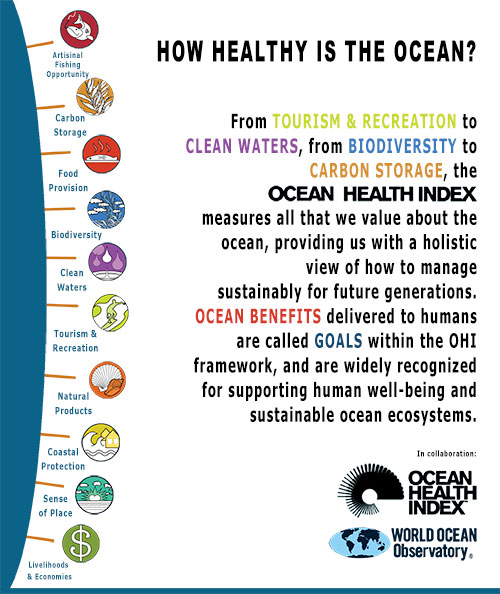 |
||
| OCEAN HEALTH INDEX Week 1: An Overview April 2 In the coming months, the World Ocean Observatory, in collaboration with the Ocean Health Index, will be highlighting the goals and sub-goals of the Index and how countries are measuring up based on the 2020 Index numbers. Between now and late June we will be introducing you to the OHI framework by outlining details of the matrix and providing a general overview of the ten goals and sub-goals-—the benefits delivered to humans that are widely recognized for supporting human well-being and sustainable ocean ecosystems. In the subsequent months we will lay the groundwork for more specific and sophisticated data and goal relationships with country-by-country comparisons. Look for new posts each Friday to social media, and stay tuned for World Ocean Forum posts and an early 2022 World Ocean Journal issue dedicated to celebrating OHI’s 10th Anniversary.
Learn more: |
||
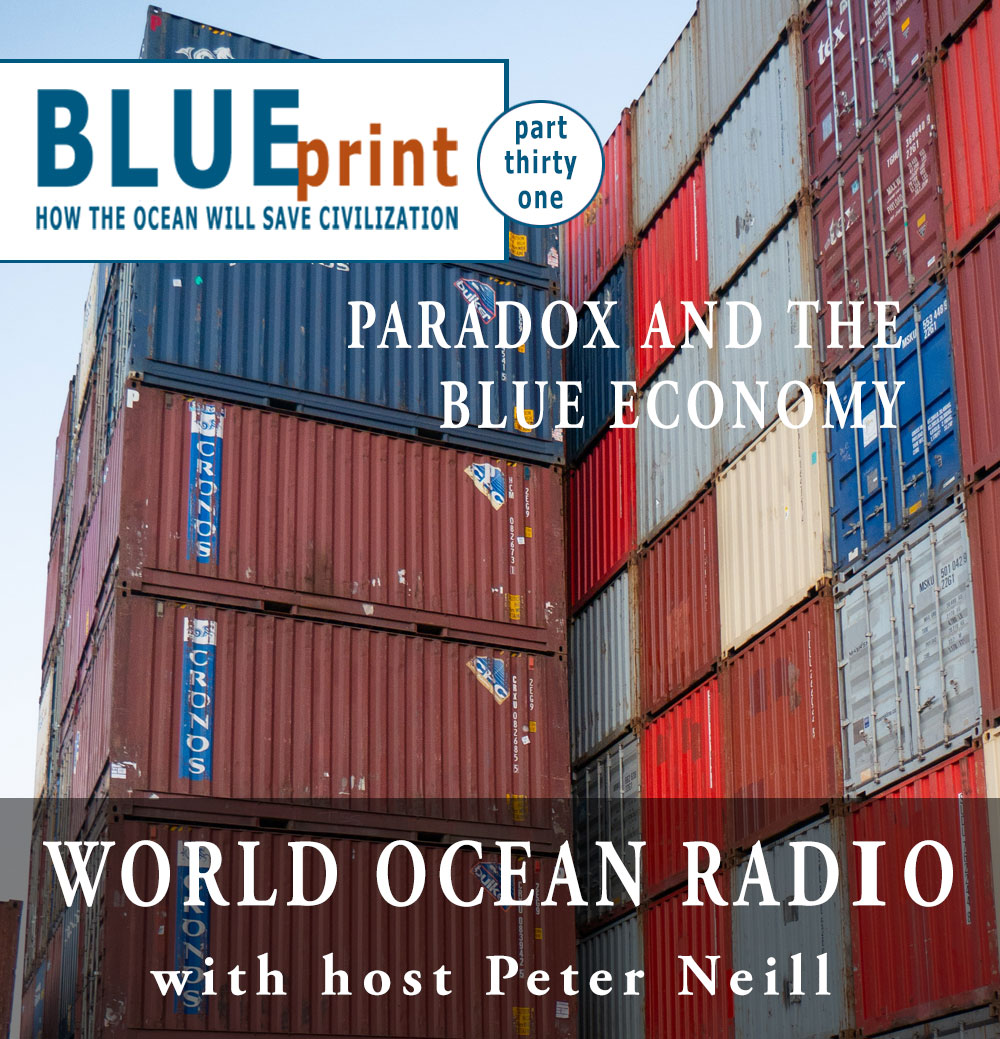 |
||
| WORLD OCEAN RADIO Paradox and the Blue Economy March 29, 2021 This week on World Ocean Radio we broadcast the 31st part of the ongoing BLUEprint series. In this episode we discuss the Blue Economy and the "business as usual" operations of The Ocean 100--the largest trans-national companies that account for the most profits from the ocean while also generating the most emissions, waste and other pollutants to the ocean. We describe what is known as the Blue Acceleration and argue that current economic activity is not meeting the requirements for economic growth and improved livelihoods while simultaneously preserving the health of the ocean ecosystem, and that these Ocean 100 companies could be a force for change of the Blue Economy with help from public awareness and consumer pressure. |
||
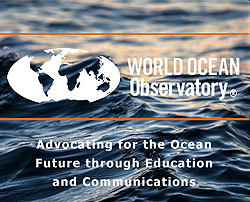 |
||
| MAKING WAVES March News from the World Ocean Observatory In this issue: collaboration with the Ocean Health Index; this week on World Ocean Forum; new curriculum resources: Ocean Curriculum Catalog; new app for the #ocean; World Ocean Radio BLUEprint series continues; Aqua/Terra early release. |
||
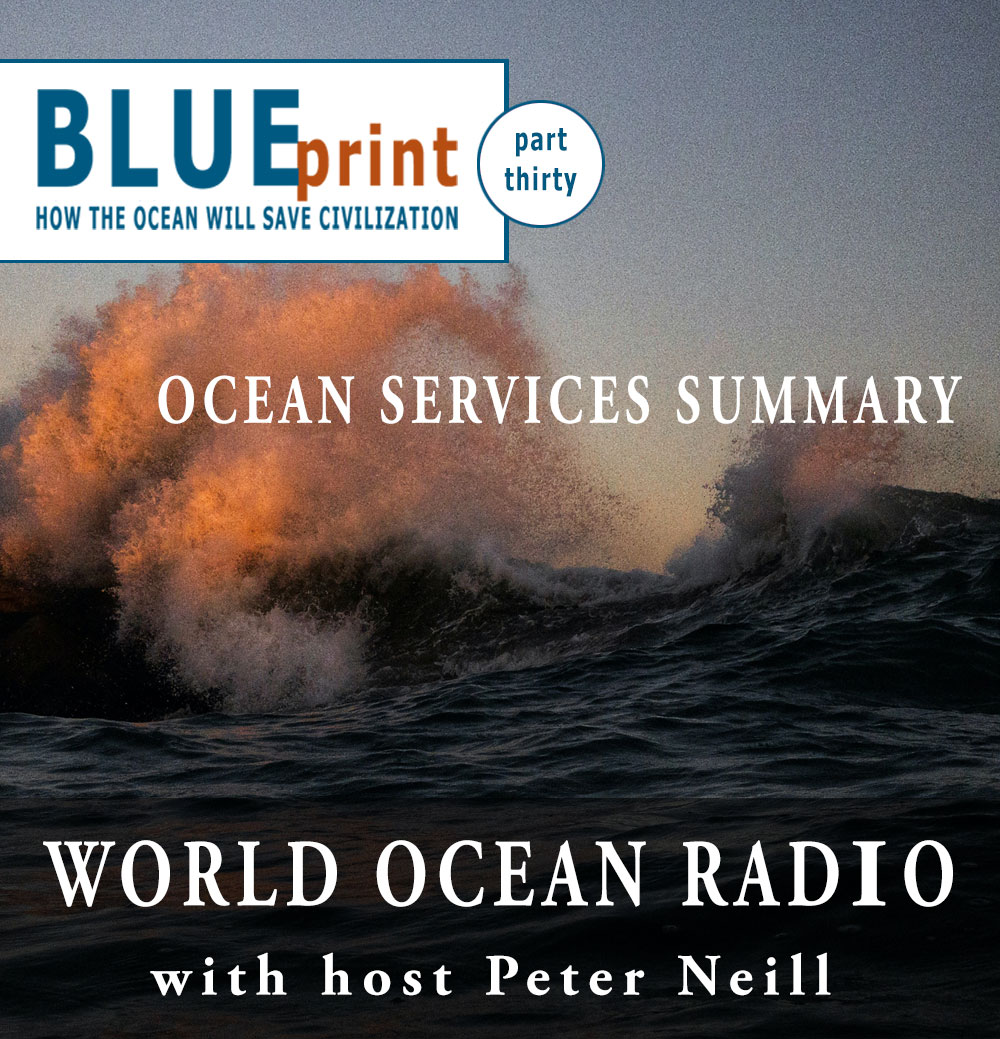 |
||
| WORLD OCEAN RADIO An Ocean Services Summary March 22, 2021 This week on World Ocean Radio: part thirty of the multi-part BLUEprint series. In this episode we ask, "What is the natural capital value of our human connection to the Ocean?" and we provide ten declarations concluding that the ocean is the essential place for us to imagine, implement and design a sustainable future for humankind. |
||
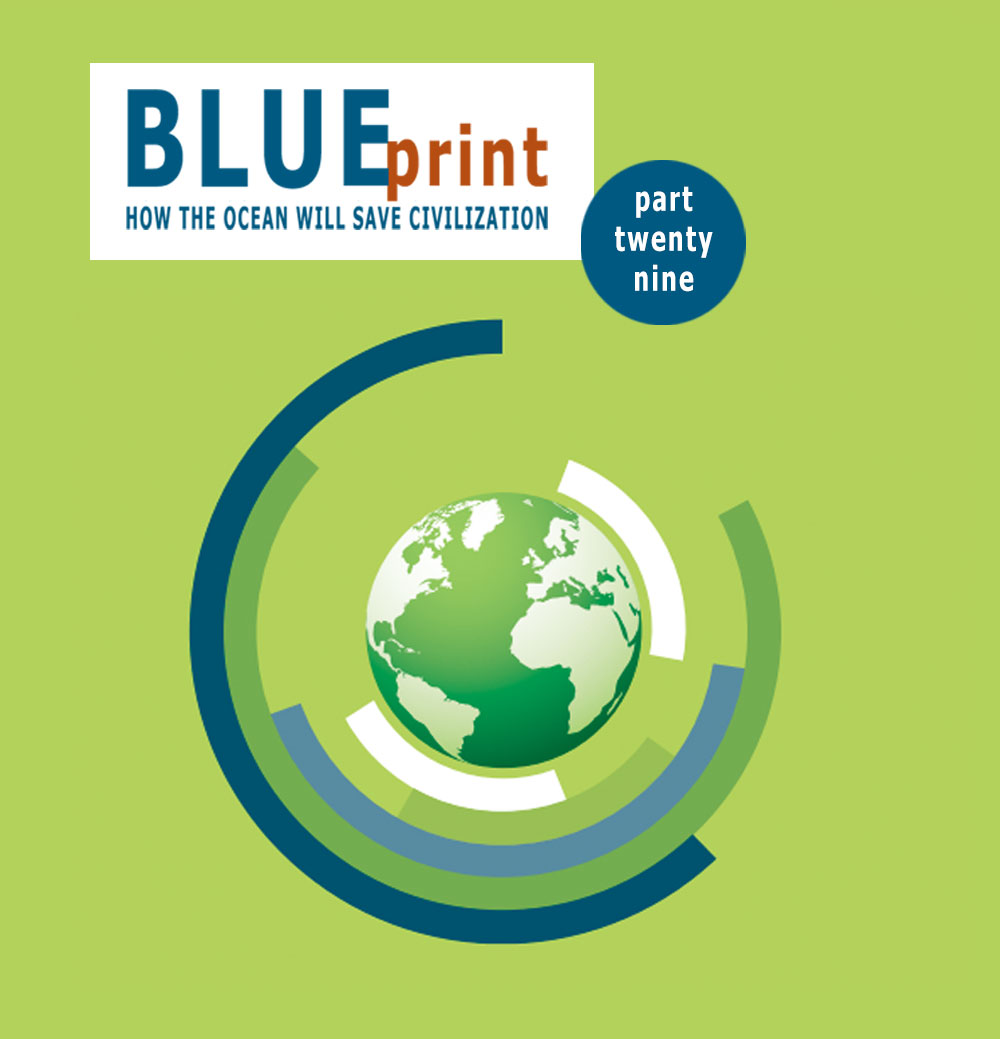 |
||
| WORLD OCEAN RADIO The UN Environmental Accounting Framework: A Breaking Wave March 15, 2021 |
||
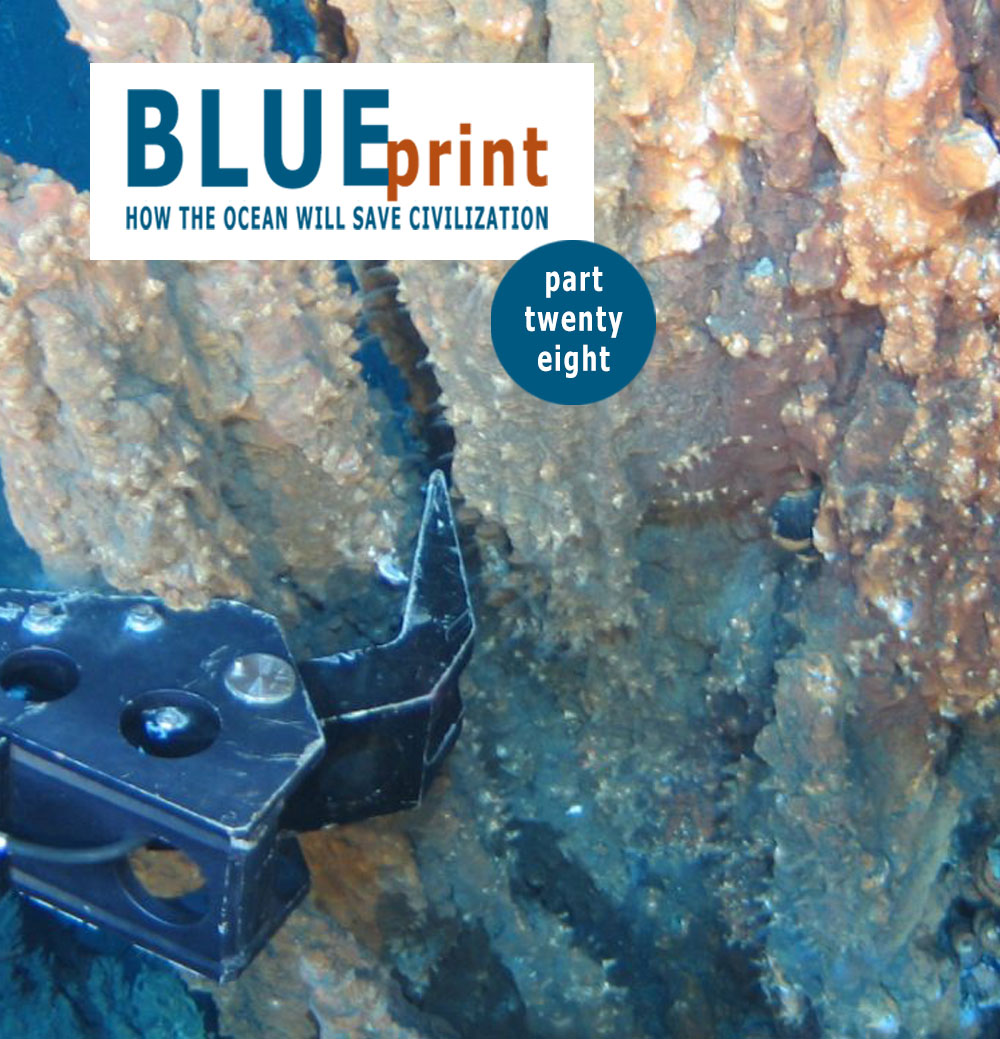 |
||
| WORLD OCEAN RADIO Batteries: The Rare Metal Quandary and the Deep Sea March 8, 2021 |
||
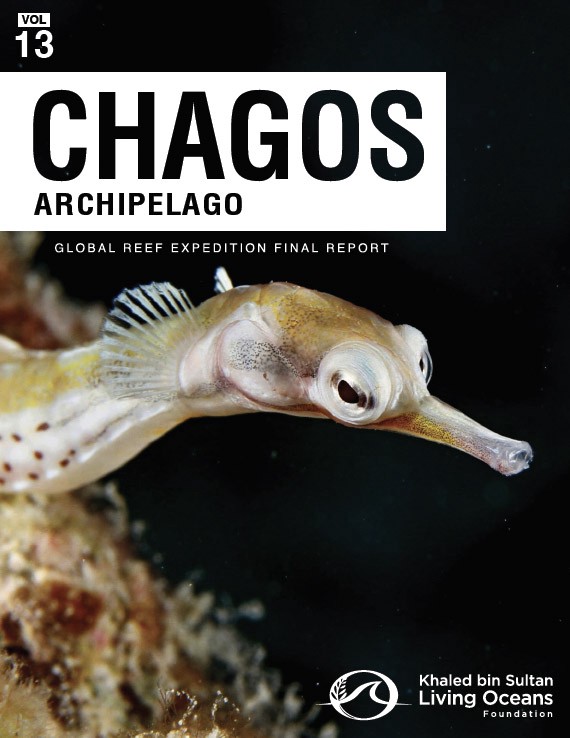 |
||
| WORLD OCEAN FORUM Value Trade Off March 5, 2021 Our latest World Ocean Forum post comes to us from the Khaled bin Sultan Living Oceans Foundation and their Global Reef Expedition to assess the state of coral reefs around the world. This ambitious five-year scientific mission was designed to evaluate the status of the benthic and reef fish communities, and assess the impact of anthropogenic and natural disturbances on coral reef ecosystems. The 2015 GRE mission to the Chagos Archipelago allowed an international team of scientists to study some of the most remote and undisturbed coral reefs in the world. Toward the end of the research mission, KSLOF scientists witnessed the beginning of what would become a catastrophic mass global bleaching event, illustrating that negative human impacts reach even the most isolated and well-protected coral reefs on Earth. |
||
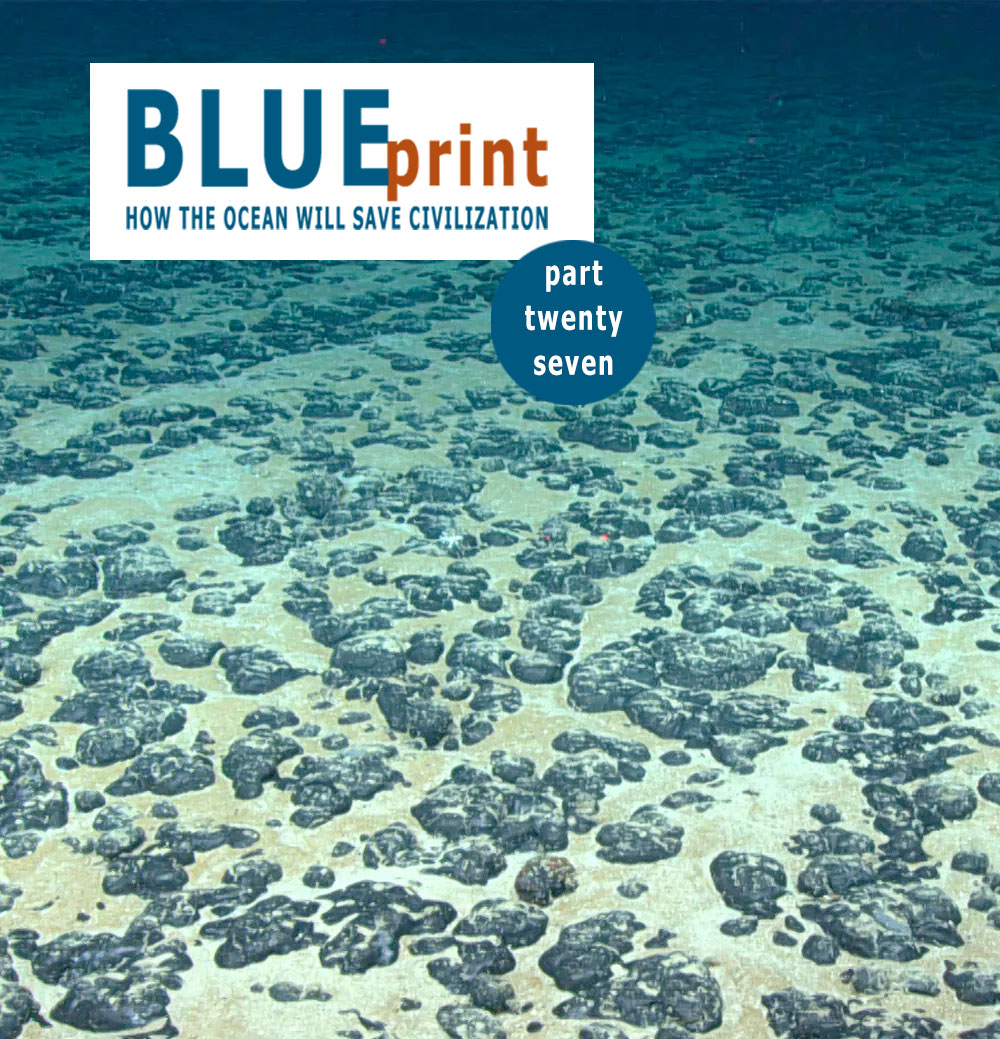 |
||
| WORLD OCEAN RADIO Value Trade Off March 1, 2021 This week on World Ocean Radio: part twenty-seven of the multi-part BLUEprint series. In this episode we talk about a carbon-free future: one that requires batteries that currently rely on rare metals such as nickel, copper, cobalt and molybdenum being extracted from the sea floor in the central Pacific Clarion Clipperton Fracture Zone, threatening biodiversity and the nearby Pacific small island states. Will the short-term financial profit over the long-term social and ecosystem loss be worth the trade off? |
||
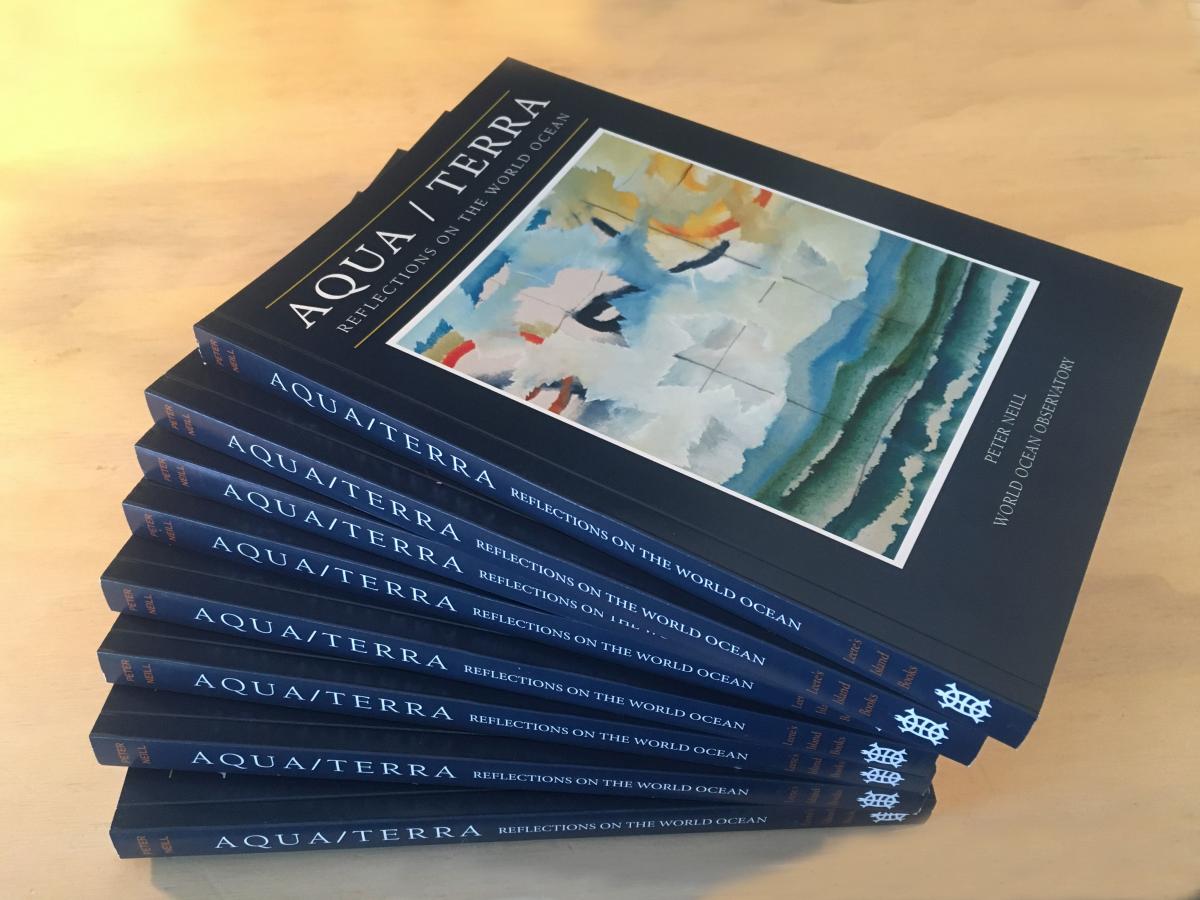 |
||
| AQUA/TERRA: Reflections on the World Ocean Signed copies of Peter Neill's newest book are now available. "Aqua/Terra" offers a series of brief essays and insights with personal feelings and observations about the world ocean. To order your signed early release copy ($20 includes shipping within the continental US) send an email to director@thew2o.net. "Aqua/Terra" is the fourth in a series of World Ocean Publications — provocative non-fiction titles about the ocean, published in association with Leete's Island Books. Get your early release signed copy today! |
||
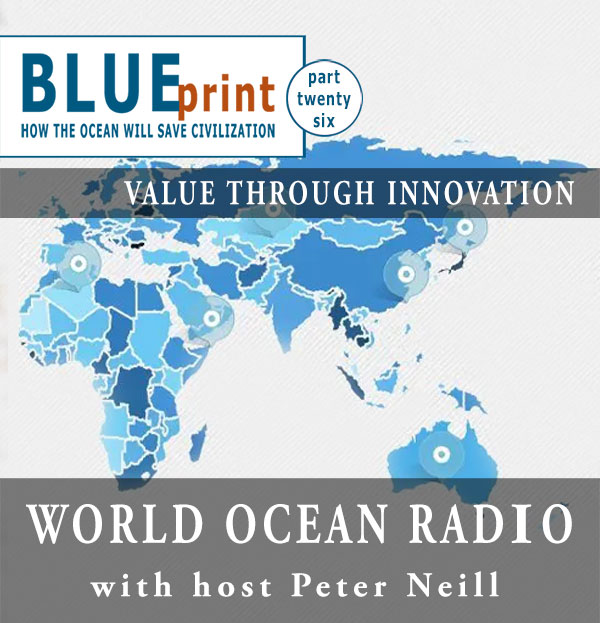 |
||
| WORLD OCEAN RADIO Valuing Cultural Resources February 22, 2021 This week on World Ocean Radio: part twenty-six of the multi-part BLUEprint series. In this episode we introduce listeners to Molly Burhans, a young activist and founder of GoodLands, who is using geographic information systems (GIS) to map the worldwide holdings of the Catholic Church as an inventory of ownership and potential investment for society, health, security and ecological justice. Burhans and her group are mapping archived Vatican holdings that have never been recorded using GIS software--a revolutionary step toward committing them to ecological planning, environmental protection, climate mitigation, sustainability of natural resources, and a potential contribution to a global renaissance. |
||
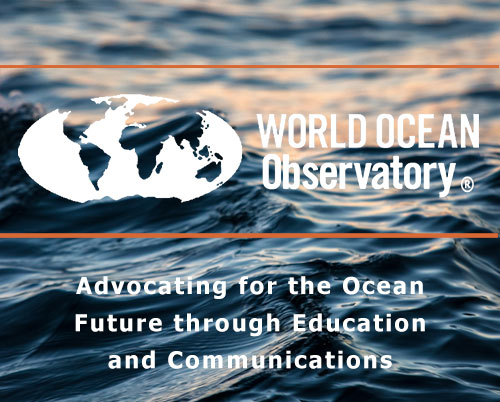 |
||
| MAKING WAVES February News from the World Ocean Observatory In this issue: A new collaboration between Schmidt Ocean Institute and World Ocean Explorer; Aqua/Terra signed copies available; 30x30 bold new goal; How to Understand the World We Live In; World Ocean Radio BLUEprint Series; Dispatches from the W2O: A collaboration with the Island Institute. |
||
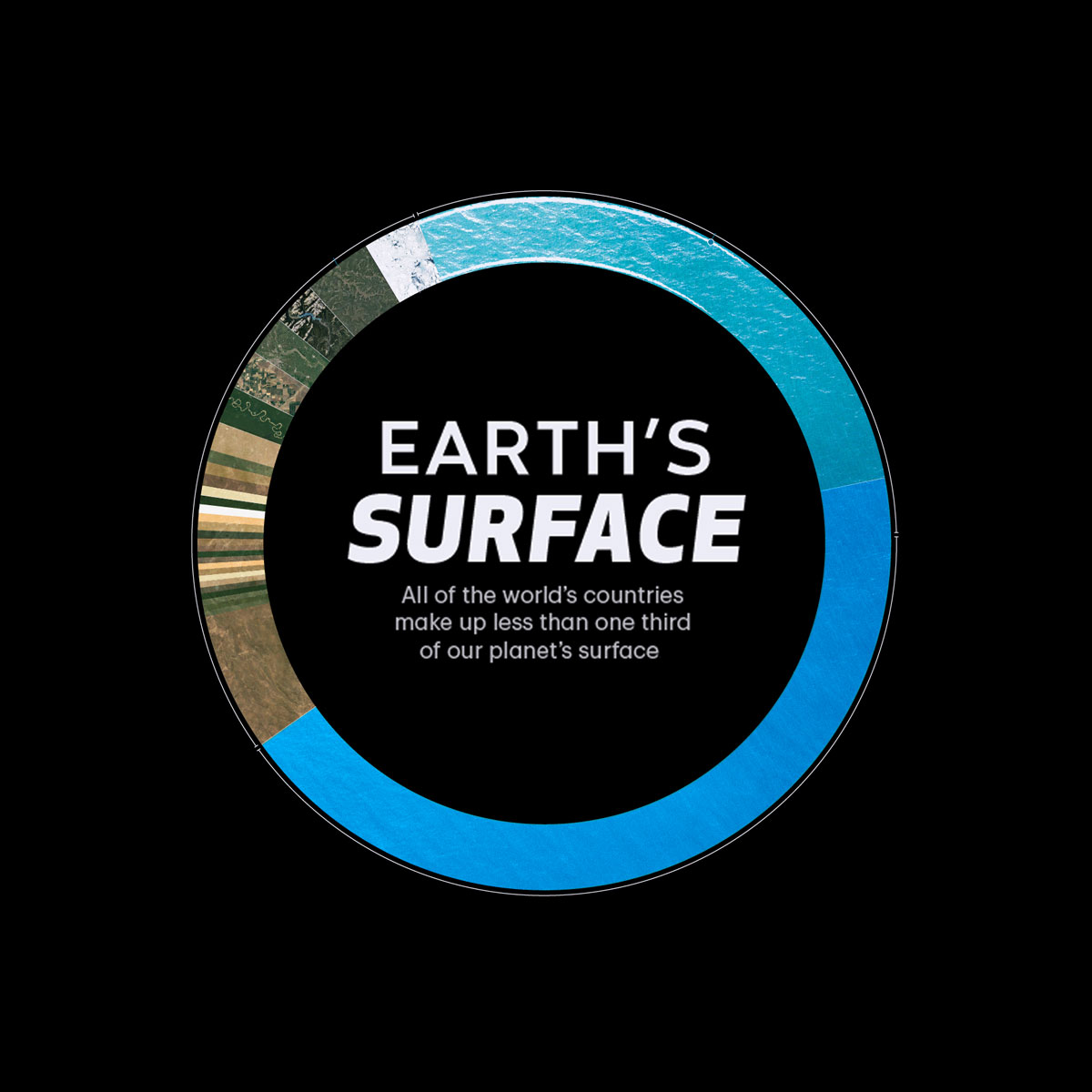 |
||
| WORLD OCEAN RADIO How to Understand the Ocean February 15, 2021 This week on World Ocean Radio: part twenty-five of the multi-part BLUEprint series. In this episode: the importance of ocean literacy and ocean education to transform our understanding of the ocean's contributions to human health and survival. We discuss the seven principles of Ocean Literacy and some perspectives that we can use to expand those principles into a set of curricular approaches that pertain to science, climate impacts and solutions for our future. Pictured: Visualizing Countries By Share of Earth's Surface Credit: Virtual Capitalist |
||
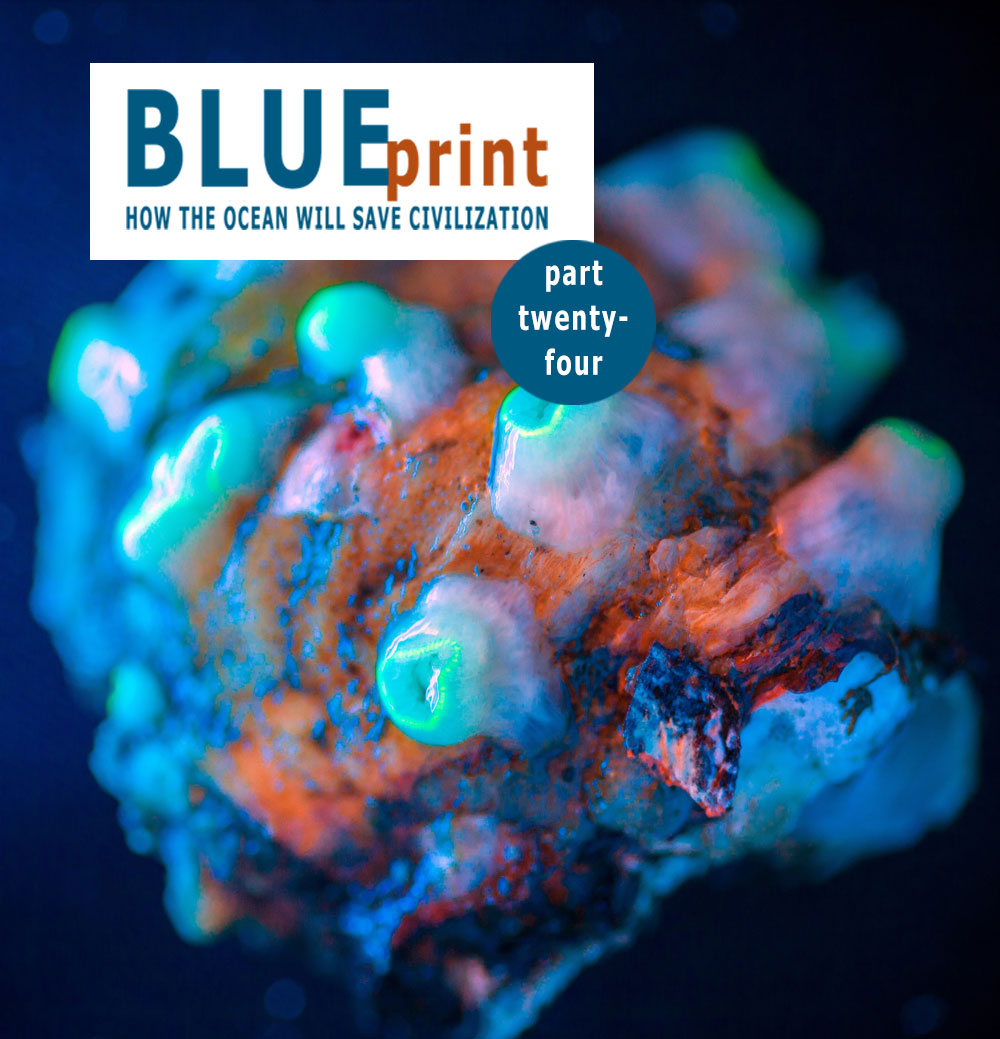 |
||
| WORLD OCEAN RADIO Valuing Cultural Resources February 8, 2021 This week on World Ocean Radio: part twenty-four of the multi-part BLUEprint series. In this episode: the myriad ways that UNESCO World Heritage Sites--on land and at sea--are an essential part of a strategy to conserve and protect the ocean’s vast contributions to our scientific knowledge. But also their importance for our cultural history, for protection, conservation, diversity, sustainability, survivability, and as treasured pieces of our cultural heritage that connect us for generations to come. |
||
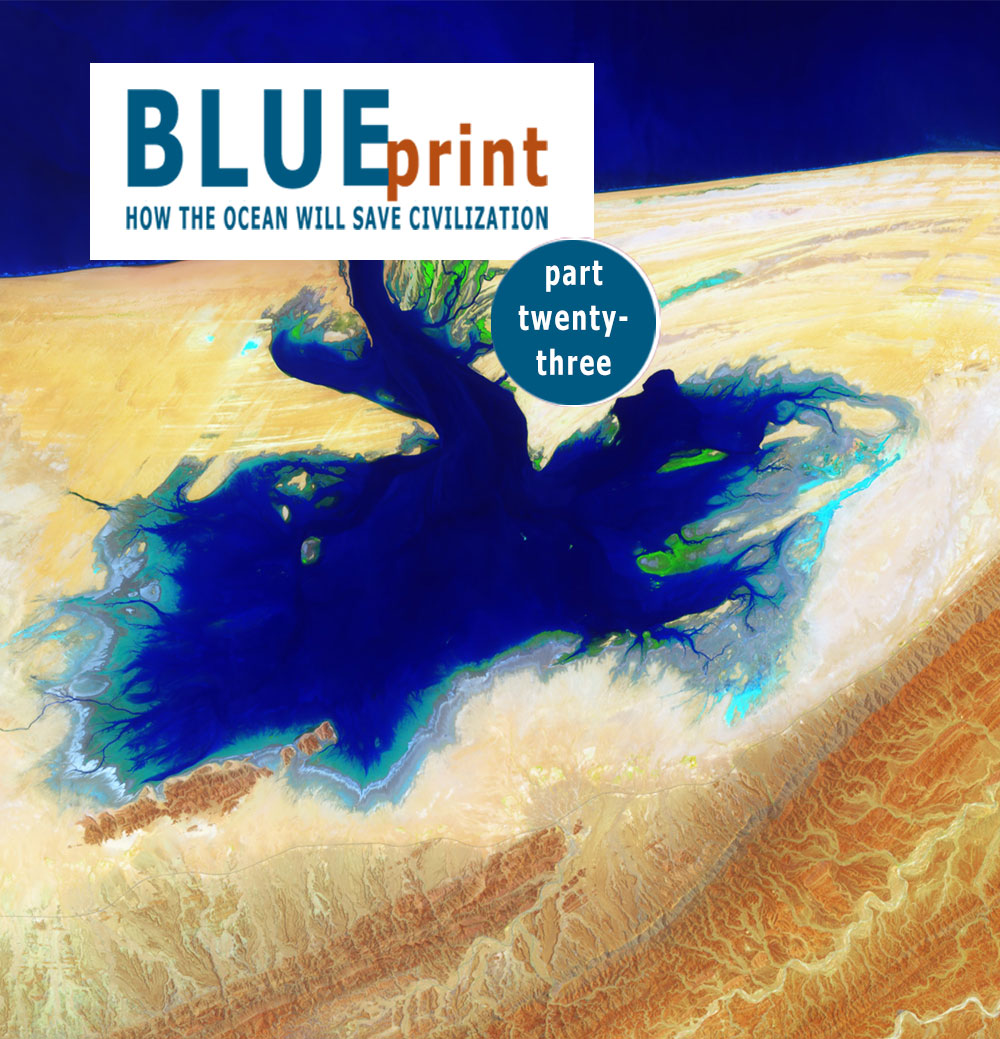 |
||
| WORLD OCEAN RADIO Units of Calculation February 2, 2021 This week on World Ocean Radio: part twenty-three of the BLUEprint series. In this episode: the importance of including true accounting costs for natural resources extracted or exploited; for the downstream effects of industry and enterprise; for loss of revenue by destroyed habitats; and much more. We argue that ecosystem services can be easily estimated and added as we begin to calculate the true costs of all externals for inclusion in future analyses and development. |
||
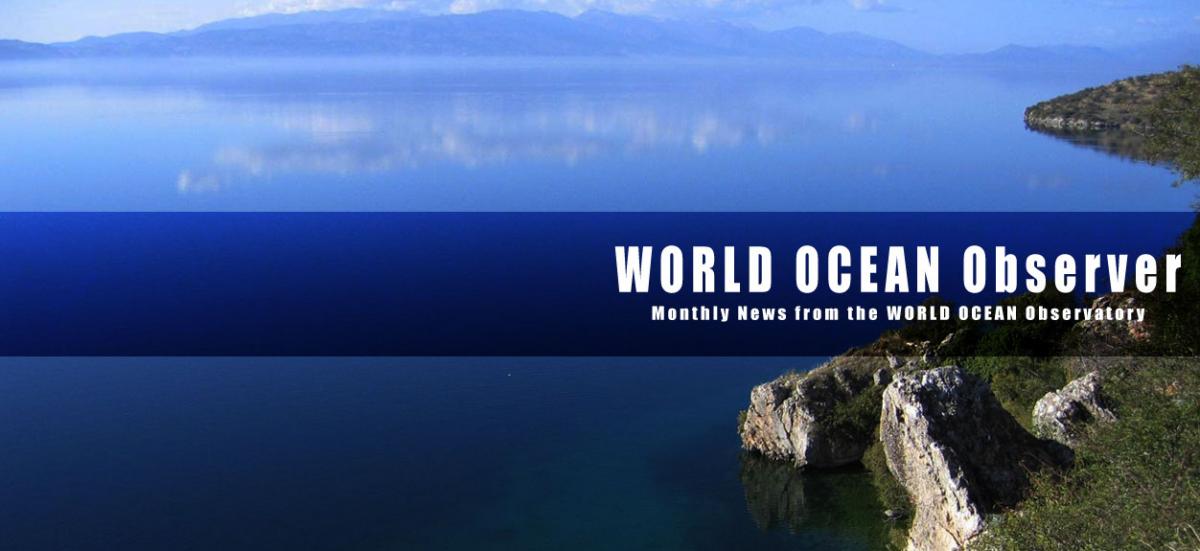 |
||
| MONTHLY ENEWS - View the archive - Join our mailing list |


